#i think i might have to do some filmmaking stuff as part of my thesis project and I'm like oh well at least i know a bit about that now
Explore tagged Tumblr posts
Note
I just came across the "Daniel howell breeding kink" clip and immediately thought of you.
Your legacy
-phivega
That shit truly changed me as a person. Talking about it on anon on jams blog was the reason I decided to make this blog in the first place. Like I realized I needed an outlet for talking about how insane dnp are and how insane they make me 😭 And now I've created so much art, started writing again and remembered how much I love it, learned new skills (editing and gif making) and met new really cool people because of this like... It really changed the trajectory of my life I'm being so serious.......
#it truly shook me to my core#like why did he say that. why did he say it I'm gonna be thinking about this for the rest of my life#ask#phan#i think i might have to do some filmmaking stuff as part of my thesis project and I'm like oh well at least i know a bit about that now#like i have genuinely learned life skills because of that fucking breeding kink clip it's actually ridiculous#and writing fic has really cemented in my mind that i need to do something related to writing in my life.#the Daniel Howell Breeding Kink clip CHANGED LIVES I'M BEING SO SERIOUS!!!!!!
8 notes
·
View notes
Text

So not to be dramatic, but if you could get a degree in discourse-ology, the topic of my master’s thesis would definitely be “Which political candidates did the characters of the CW’s Gossip Girl (2007-2012) support?” I’m doing this in order from most to least obvious, and considering both the 2016 and 2020 presidential elections.
[ little ivy interjection here: i haven’t changed ANYTHING, except adding a screencap of the title + the submission, because that made me laugh & more people deserve to see it, and putting this under a read more because that’s how i generally try & organise stuff on this blog. so this submission is exactly as it was when i received it! also while we’re at it, anon, this MADE my day.]
Blair Waldorf: “Hillary Clinton is one of my role models. I do not break treaties, you ass!” (04x13) There’s no question that Blair would go hard for Hillary in 2016, she praised her on multiple occasions throughout the series. Blair’s a classic American neoliberal, third wave Democrat-type: she’s decently progressive when it comes to social policies, and would be decidedly supportive of causes like gay marriage, racial equity, and women’s reproductive rights, but she’s still very much in favor of maintaining the status quo when it comes to capitalism and the hegemonic structure of power that, lets face it, heavily favors her own class interests. To use the American healthcare system as an example: Blair would have been all for the Affordable Care Act, and is largely supportive of the idea of creating a public option - but single payer, nationalized health care? It just wouldn't work in a country like the United States for “X” reason (although the real reason, deep down, is that she doesn’t want to see her tax rate go up in any meaningful way). So she’s thoroughly for Clinton in both the 2016 primaries and the general election, she maybe even comes out with a line of high-end “I’m With Her” merchandise if she’s still CEO of Waldorf Designs, and is personally heartbroken when Clinton loses.
Flash forward to the 2020 primaries. Blairhates Donald Trump, like emotionally, viscerally hates him - his misogyny, his incompetence, and his blatant tackiness are a direct repudiation of her beliefs, and the fact that he’s representing Manhattan society and the Upper East Side to the world in such a godawful way is frankly embarrassing. So in a certain sense, her strategy, like frankly many Americans at the time going into the 2020 Democratic primaries is, “Which one of these candidates has the greatest chance at beating Donald Trump?” I see Blair being rather conflicted at first, but ultimately going for either Amy Klobuchar or Kamala Harris. She has a certain admiration for Elizabeth Warren given her professional background, but her policies are a bit too progressive for someone like Blair. Buttigeg is fine, but not especially thrilling. Biden, quite frankly, doesn’t seem like he has any real chance at winning, although I think he’d be Blair’s third choice after Harris and Klobuchar. I can see her leaning more towards Harris ultimately - although, after the “Amy Klobuchar throws staplers at her interns!!” rumors start spreading, Blair cannot help but, at a personal level, kind of respect her for that. When Biden unexpectedly takes South Carolina and then the Democratic nomination, Blair is a bit disappointed, but not overly so, and quickly marshals her financial resources into supporting and fundraising for him for the remainder of the election. At least it’s not Sanders - or Bloomberg. As a New Yorker, of course Blair’s opinion is “Fuck Michael Bloomberg”.
Chuck Bass: Now here’s where it gets interesting. Chuck, as you said, isn’t stupid - there’s no way he falls for the “build the wall” crap or any of Trump’s rhetoric, he knows it’s a bullshit farce and sees right through it. But you know what he definitely is? Deeply greedy and deeply selfish. I’m hardly the first person to point this out, but Chuck Bass is, in many ways, the fictional equivalent of the Donald Trumps and Michael Bloombergs and Brett Kavanaughs of the world - new money billionaire who inherited his wealth from his father working in the real estate industry, who despite his lack of business acumen and deeply problematic history with women, has managed to coast through life failing upwards with absolutely no social or legal accountability? I mean, back in 2010, Forbes Magazine actually did a real interview with the fictional Chuck Bass in which they outright compare him to Donald Trump. I couldn’t tell you if the Gossip Girl writers meant to write Chuck as their Trump analogue - I mean, they did invite Jared and Ivanka onto the show, after all - but the parallels are just too strong to ignore. All of which is to say, not only did Chuck Bass vote for Donald Trump, he held exclusive political fundraisers for him and was probably a substantial donor to his campaign. Now, did Chuck distance himself publicly over time as the political climate became increasingly caustic and public sentiment towards Trump plummeted even further? Perhaps, perhaps not. It really depends on if the board of Bass Industries felt like being connected to Trump was a liability or an asset - but privately, I imagine Chuck once again voted for him in 2020, because the one policy Donald Trump did effectively execute during his tenure in office was massive tax cuts for billionaires, and for someone like Chuck Bass, that’s the only political policy that really matters. He wouldn’t wear a red hat and wouldn’t be caught dead within sniffing distance of a MAGA rally and the hoi polloi, but dude is basically the image of what the kind of rich conservatives backing the Trump administration for personal gain look like. On the off chance that the distastefulness of it all got to be a little much for even Chuck post-2016, perhaps he might switch his vote to Bloomberg. But I highly doubt Chuck would be politically invested in anything other than his own wallet to such an extent that he wouldn’t vote for Trump, no matter how much it would no doubt completely infuriate Blair.
Dan Humphrey: As the unofficial king of the hipsters, Dan has been a Sanders supporter since before it was cool. Seriously, Bernie Sanders appeals to Dan intrinsically on every level - his policies, his rhetoric, even his aesthetic - the rumpled old man with wild hair wearing mittens and railing against the upper class is the sort of thing that’s basically political catnip for someone like Dan Humphrey. Not only would Dan vote for Sanders in both the 2016 and 2020 primaries, he’d go out and be one of the celebrities campaigning for him. This would definitely lead to him butting heads with Blair, and she would no doubt call him out on supporting someone like Sanders when Dan himself is now a millionaire, who made his money from writing stories about the upper class. The fact that in 2017 he apparently gets married to Serena, a billionaire heiress, and may or may not have been engaged to her back in 2016 when the Democratic primaries were happening might cause him a bit of cognitive dissonance, but really, just because he’s climbed up the socio-economic ladder now doesn’t mean his values have really changed, have they? (Debatable.) In any case, in both the 2016 and 2020 general elections, Dan would definitely vote for Clinton and Biden respectively - although he’d be significantly more disgruntled about it than Blair would be switching from Harris to Biden. I don’t think Dan would be a “Bernie bro” in the way that term is used, but he’d definitely chafe against Clinton’s past policy decisions, and would probably make some snippy Tweets about her during the election. Nevertheless, once it became clear that Trump was going to be the Republican nominee and was a serious threat, I think Dan would change his tone and start encouraging his fans and followers to vote for Clinton. Likewise, in 2020, Dan would probably become one of the Sanders supporters doing outreach for Biden, having become more politically pragmatic following the experience of living under the Trump administration.
Vanessa Abrams: Much like Dan, Vanessa is a progressive, although unlike Dan, Vanessa’s activism is more focused around specific issues and less around specific politicians. I can see Dan and Vanessa being in roughly the same place in 2016, and given that the only real choices were between Sanders and Clinton in the primaries (RIP to Martin O'Malley), Vanessa would no doubt go for Sanders. Whereas Dan might campaign for Sanders directly however, Vanessa would instead focus her time and resources around advocacy for specific causes that are important to her, like climate change and racial justice, and would probably use her platform as a filmmaker and documentarian to advance those causes. I could very much see her getting involved with movements like Black Lives Matter and organizations like the Sunrise Movement, and taking part in protests, marches, and sit-ins. When the 2020 Democratic primaries come around, I could see her possibly switching from Sanders to Warren for a while (and Dan would definitely argue with her about it if she did), but I can also see her switching back to Sanders after Warren amended her support for single-payer, “Medicare for All”. She’d definitely vote for Clinton and Biden in the generals, but not enthusiastically.
Nate Archibald: For someone whose family business is politics and who, in 2017, is apparently a candidate in the New York City mayoral election, Nate seems to be rather removed from politics. As Vanessa puts it in 02x19, “The only thing Nate’s ever voted for is American Idol.” Still, as Editor-in-Chief of The Spectator, Nate kind of has to have an opinion, and in that respect, I see him gravitating towards the type of center-left “establishment” candidates that he and his family would no doubt have close ties with. In the Gossip Girl universe, the Vanderbilts are portrayed as being a lot like the Kennedys, and I think Nate’s policies as a mayoral candidate would really reflect that. In 2016, he would vote for Hillary Clinton in both the primaries and the generals without much of a second thought - after all, she’s the obvious choice, and there’s no way a candidate like Donald Trump could actually beat her, right? Actually, optimistically, maybe that’s why Nate decides to jump into the mayoral race in 2017 - previously, he had been for all intents and purposes politically apathetic, but seeing someone as genuinely vile as Donald Trump ascend to the office of the presidency stirs him out of that apathy, and he wants to make a positive difference in the only way an incredibly privileged white man from a politically prominent family knows how. So he runs as a Kennedy-esque center left candidate, further left of someone like Hillary Clinton, but more moderate than someone like Elizabeth Warren - sort of like Kamala Harris, now that I think about it. I have no idea if he would actually be able to beat Bill de Blasio given the major incumbency advantage de Blasio would have, but who knows. Come the 2020 Democratic primaries, I think Nate would probably just vote for whoever he believed was most likely to beat Donald Trump. I don’t see him having any sort of clear preference - maybe he would gravitate towards Biden on the basis of him being the most established candidate, or maybe he would gravitate towards Harris on the basis of her campaigning as the “moderate progressive” candidate. I could also seeing him liking Andrew Yang, come to think of it. In any case, he would most definitely support Joe Biden in the generals. How involved he’d be in supporting him really depends on whether or not Nate actually gets elected to mayor - if he was the mayor, he’d definitely endorse him and probably donate to him, but I think he’d be too wrapped up in his own political responsibilities to really do much more than that. If, however, he lost the election and was still the Editor-in-Chief of The Spectator, I can see Nate getting more involved alongside the rest of his family, officially endorsing him in The Spectator, hosting political fundraisers for him, and maybe even campaigning for him. The Vanderbilts in the Gossip Girl universe (I have no idea what the family’s actual political beliefs are in real life) definitely seem to me like they’d be Biden supporters, and I imagine they’d use their political clout to try and get Biden in, and more importantly, Trump out.
Serena van der Woodsen: Oh Serena. Look, she knows it’s important, okay? It’s just, she’s been really busy lately, and she doesn’t really like to think about politics, and hey, remember that fundraiser she did with her mom for last month’s philanthropic cause du jour? Serena’s a Democrat, vaguely, but if you tried to really pin her down on her political beliefs she’d probably just change the topic. So who does she vote for in 2016? The truth is, she doesn’t. Not in the primaries, not in the general, not at all. She meant to, okay, Blair’s definitely been pestering her to send in her mail-in-ballot for weeks, but she just got distracted and forgot. Serena really strikes me as the kind of person who doesn’t enjoy thinking or talking about politics, save for perhaps a few specific issues, and she has a sense that everything will work itself out eventually and she doesn’t really need to participate. And then the 2016 election happens, and holy shit, she didn’t vote. Blair and Dan might have spent early 2016 bickering with each other over Clinton versus Sanders, but the one thing they can definitely agree on is “What the fuck, Serena?!?!” They both reminded her like, a million times, how could she possibly forget?! Serena feels really bad about it - she didn’t think it was such a big deal, she didn’t think Donald Trump could actually win! - and so she starts overcompensating whenever the topic of politics comes up, maybe even joins Vanessa at a few protests and marches, even though she’s still sort of clueless about the actual issues at hand. She does vote in the 2018 midterms, although only in the general election - straight blue ticket, all the way down. She takes a picture of herself at the voting booth wearing an “I Voted!” sticker and posts it on Instagram, tagging both Dan and Blair in the post (who already voted weeks ago using mail-in ballots, but it’s the thought that counts). Flash forward to 2020, and she really needs to make a decision about who to vote for in the primaries… but there’s just so many choices. Everything seems so scary and stressful and real in a way now that it didn’t back in 2016, and she can’t just ignore it and assume things will work out for the best like she did back then. So who does she vote for? Well, Serena always wins, so she votes for Biden. Conspiratorially, both Dan and Blair privately wonder if her voting for Biden isn’t on some cosmic level the reason for his unexpected victory, even if they know there’s no logical way that’s possible, right? But it would be such a Serena thing to do… In any case, Serena’s just happy her candidate won, and would probably host political fundraisers for him with her mom’s circle of philanthropic friends. Assuming she and Dan are still married at this point, she offers to help him do political outreach to Sanders supporters to get them to vote for Biden, which he sweetly dissuades her from given that most Sanders supporters would probably dislike her on principle.
So that’s how, in my opinion, the main cast would vote, ordered roughly in how confident I am about that analysis. You could make the argument that perhaps some characters would vote or act differently based on whether or not they’re dating or married at the time - like, would Chuck openly fundraise for Trump when Blair is a dyed-in-the-wool Clinton supporter if they’re married? (He totally would.) But I tried to consider them purely on the merits of their personalities and values, and not on the particularities of their situations at the time (with the exception of Nate, just because him being in office or not would obviously make a huge difference in regards to how politically involved he’s going to be).
I wish I put as much effort into my actual university essays as I did on Gossip Girl political analysis.
#meta#gossip girl#anon you're literally a legend#i cannot believe you submitted this to my little blog when you could've like......#sent it in to vox or something#it's just SO good?#also honestly 'i wish i put as much effort into uni as i did into gg meta' is like#THE BRAND on my blog so#*raises a glass* cheers!#i don't even have words i just think you're objectively correct about ALL of this#gg politics#submission#i am LITERALLY flattered to receive this gem thank you so much?#no no flattered is the wrong word: honoured is better#but i really appreciate it is all
44 notes
·
View notes
Text

meta on media consumption as beholding, and the creation of the conservator role, based on conversations with @hdtvtits. content warning, as always, for addiction, compulsive / obsessive behavior, aggressive hoarding, and implied terminal illness, all of the eldritch variety. also allusions to real-life hollywood dramas, though nothing remotely specific is discussed in this post.
foreword: this is just the first part of a bunch of meta i’ll likely end up posting on why levi is what they are and why their beholding manifests the way it does, because like... for secrets and the underbelly of film production i have a lot to say but a lot to source as well. but there are a few things i want to address in this post, namely: what the eye feeds off of, whether or not levi is feeding the eye in their media consumption ( and how ), and how it ultimately serves the eye’s purposes to have this be levi’s method of feeding. this probably won’t even be my last post on the subject as i keep sort of logicking out the way that beholding works and how it can manifest. it’s important to me though that it exist and function outside of just what happens in the institute ( which is proven in the statements ), mostly because fear entities are global and primal and jonny said that the story really is britain-centric. now, media consumption isn’t particularly groundbreaking; it addresses a more american culture, but that’s still western-centric and sort of ‘typical’ of europe and america, though i will say that european filmmaking as an institution is... different. it has its own history and quirks. hollywood is its own beast. someday i’ll make a post on levi’s judaism and how that interacts with beholding and manifests as more than their aesthetic, because they haven’t even used their ayin hara on this blog yet though it’s a ( minor ) power they possess, but that deserves its own post. ANYWAYS. with that said.
what does the eye feed off of? the eye doesn’t just function based off a primal fear, it has a drive that it imbues its servants with: “it is the manifestation of the fear of being watched, exposed, followed, of having secrets known, but also the drive to know and understand, even if your discoveries might destroy you.” i think that most of the entities function in a similar way, with the things they inspire and feed off of on the one hand, and avatars with a desire to evoke that fear in the other; i.e., avatars create food to feed their entity, and if they don’t, the entity devours them instead. that’s pretty basic knowledge. ( i also have stuff to say about entities consuming themselves because every time claire says autocannibalism i go absolutely hog wild about it but that’s for another day. ) there are, then, multiple ways that an avatar can go about gathering fear for its entity, but what sets the eye apart from others, i believe, is that it doesn’t need to directly cause the fear it consumes -- though i think that it finds the fear of being watched more filling than just watching other people be afraid, it can still ‘survive’ off of that. this is where eye shit starts to get confusing and it’s why these posts are so longwinded and involve me talking myself in circles, because the eye both has a specific fear that it’s linked to and can devour other people’s experiences of fear that it did not cause, yes even before the apocalypse. that’s just how jon feeds for the majority of the series. for a good long while, he’s not going out and getting statements himself; and even when he does, he’s double dipping on both the fear they convey to him about their experiences ( knowledge gained ) and the fear that this man is pulling information out of them ( secrets exposed ).
but that’s jon and we’re not talking about jon, we’re talking about levi, and my ever-evolving thesis on voyeurism in / and media.
so what does an eye avatar need to do, exactly, to eat? it needs to accumulate knowledge, that’s the baseline that it can survive off of -- knowledge of the other entities is best, but i don’t know that it’s a requirement... and i don’t know if it’s not! i am going to make the call that eye avatars can survive off of just hoarding information because the eye isn’t super picky and wants to know everything anyways, but not feeding off of fear for a long time is going to leave the avatar really weak. and for an eye avatar to develop its powers and grow, it needs to take statements directly, or else give other people the distinct feeling of being observed against their will. the more people it feeds off of as a result of its own actions, the more powerful it becomes. that said, i don’t think this is common, which is why watchers ( heads of institutes ) have set up these systems where they’re generating food for themselves on two axes simultaneously: fear of people who give statements, and fear of people who have to work at their institutes ( either taking statements or working directly under the eye ). that just sort of accumulates power upwards within eye bureaucracies, though the archivists who take and sort the statements are also going to become remarkably powerful if they lean into their role.
( also side note: these systems work for the english, american, and chinese institutes, but there are ways for beholding avatars to thrive outside of them, and again someday i’m going to post about oral traditions and the ability to craft stories in different regions of beholding that feed the eye. but i need to do research first and we’re talking about levi! )
here’s the thing... levi is not an archivist. levi is not powerful. levi does not have a strong connection to beholding. they worship it, but fanaticism does not equal feeding, sadly, and the role they’ve been given is not one that pushes them to go and gather statements for themselves. they have taken read and statements at afi, because wyatt was raising them into an avatar, but, though conservators and archivists can overlap in the real world, they ( in my word of god for this blog’s canon and the monster i made up ) are two very different things under the eye. essentially, conservators serve archivists ( and watchers ) by witnessing, recording, and playing back statements that archivists can then maneuver through. the more experienced the conservator, the more they can shift the camera, allowing the archivist to comb through statements in detail and pull the knowledge that they want from them. remember that the beholding grants knowledge, not understanding, and while that may be fine for the eye, sometimes its ‘human�� servants need to put the pieces together in order to advance its plans.
the conservator is a relatively new position within beholding, because it does function like a film camera. i think that, in other times, places, and cultures, there were similar avatars who filled a similar role, but it wasn’t the same. the conservator really is a miskatonic / american experiment to help the institute delve into the information it already possessed. for one example of how conservators are useful, consider what happened with sasha: the archivist had his voice recordings of her, because it can’t effect magnetic tape, but jon the person still had her wiped completely from his memory. that wouldn’t happen to a conservator, because all of their memories are converted into (meta)physical tape stock. they are a lockbox that cannot be opened or altered unless you’re a more powerful beholding avatar. ( the limitation here is that they only have so much storage space, they will need to expunge some memories to store more; though those memories can be kept in physical containers, film stock obviously degrades and is a very unstable and extremely flammable medium; their body will also internally decompose to make room for more data and that is a painful process that eventually renders the conservator just a storage without any ability to function beyond sitting still and replaying witnessed / read events. )
we’ve established that levi feeds normally. they take statements, they are present in an archive, they’re hearing the scary stories. finally, finally on to why levi consumes media and how levi consumes media, because the one is intrinsically linked to the other. let me start by saying that just watching television or films does not a beholding avatar make. yes you are watching, but the distinction is in whether you are passively or actively viewing. and the power that is drawn from someone zoning out and being addicted to passively consuming media does not go to the eye. that is neither a fear of being observed ( for the one watching or for the actors / writers, because nobody is going to care about an audience that doesn’t form an opinion at all beyond basic emotional reactions; uncritical consumers are milk and honey to them ) nor a pursuit of knowledge ( passively accepting knowledge is, according to elias, far less effective in raising up eye avatars than letting them learn to ‘see’ on their own ). all that power goes to mx media ( @hdtvtits ) or, if you don’t like crossovers, Just Definitely Not the Eye. it’s when you start performing analysis that the eye takes interest -- which is why the eye continues to thrive in academia ( au where i write meta on just how bad that gets, historically, but again there are things we don’t get into until we research thoroughly ). the more you lose yourself in compiling information, to the exclusion of everything else, the more you appeal to beholding. and when you start unveiling secrets, which there are plenty of in film and film production, things kept private from the audience, ‘movie magic’, then feeding can begin.
this may come as a surprise, but levi does not have a response to whether or not they ‘like’ movies. if you ask them, ‘did you enjoy that movie?’ they will not say ‘yes’ or ‘no’, they will just start launching into ripping it apart. levi probably started out enjoying movies recreationally, but at some point, they became not just unwilling to but incapable of watching films without analyzing -- and what separates this from normal people who are conscientious and engaged viewers is that this is a mania that spans hours. their ‘digestion’ of a film is obsessive and has a physical component because it is eldritch in nature. i can’t stress enough that levi isn’t just a pretentious film buff who says ‘oh i can’t consume media for pleasure or uncritically’, though they may have been at some point in their college career! they have a physical and metaphysical makeup that drives them to frenzy over what they watch. the instant they finish a film, they’ll begin a rapid accumulation of knowledge of anything they can dig up: the who, what, when, where, why, how. if they do have an emotional response, it’s incredibly removed, and their way of processing it is to drill into how and why the film made them feel that way.
if they try to avoid this step in the process -- if they just watch a movie, turn it off, and attempt to go to bed -- they will start to weaken immediately. watching the movie isn’t enough for feeding. if it was, the eye wouldn’t take any interest at all. it’s the genuinely out-of-control driving impulse to keep researching and researching until there is nothing left about a piece of media that isn’t known, shredding through academic papers and script drafts and director’s notes and interviews and everything they can get their hands on, that stems from and feeds beholding. they do not settle for what is put on the screen. they will even cold call creators in a fit and try to get them to talk about the production ( which is, yes, invasive -- beholding is an eldritch entity, it is not healthy or good and does not inspire healthy or good habits! ).
they may not even be capable of enjoying a piece on its own merits; it’s all about the world it opens up to them, it’s about stuffing themselves with information until they can’t breathe and overstimulate and pass out. then recovery from that can take days as they process what they learned and sort it all out in their mind. they don’t really do much with this information; just knowing it is enough. if an archivist or watcher wants to take action about it, they can ask levi to spit it back up for them. but ultimately, despite the impact that this has on their health, this is still low-level feeding for a low-level avatar. unless it’s a truly gruesome movie or has an exceptionally shady production background, it’s not really the fear that the eye is looking for. levi is feeding one half of beholding, the half that wants them to consume knowledge and secrets. if levi didn’t take / read statements as well, or go out and witness live horrific events, they would probably starve -- their body would eat itself processing knowledge.
and i will talk about the component of parasocial relationships, anxiety that stems from being an actor / director / content creator in general and having your work and your image spiral out of control as it’s ripped apart and dissected by consumers, because that is beholding territory as well. it’s just not actually what levi does, but because it relates to the media-beholding relationship, i’ll have it on this blog.
1 note
·
View note
Photo

Sommar Loving: The Ari Aster Q&A.
“The best filmmaking is mischief-making.” —Midsommar director Ari Aster confesses to being a nervous wreck while answering Letterboxd members’ questions about pagan rituals, grotesque imagery and psychedelic drugs.
It’s crazy to think that only two years ago, Ari Aster was just another New York filmmaker with a few shorts under his belt. But by this time last year, his debut feature, the Toni Collette-starring Hereditary, had taken out the title of most popular film on Letterboxd for the month of June, and ended the year as our Highest Rated Horror for 2018.
Not that he had a moment to enjoy it. Last August, while Hereditary was still in cinemas, Aster was already in Hungary (standing in for Sweden) filming his new horror, Midsommar, with Florence Pugh in the lead role. It was an assignment from a Swedish production company that he almost refused, until he saw it as an opportunity to process the break-up he was going through at the time.
In an insanely tight turnaround, Midsommar is out less than a year since it was shot, and feedback for the film on Letterboxd is largely positive. Midsommar “manages to be the perfect rom-com and the most mesmerizing horror film of the year,” according to Owen, and the film proves to SilentDawn that “Aster is a capable craftsman and an auteur with many dastardly thoughts on his mind”. Laura declares: “Nobody makes me feel as icky, awful, and downright dreadful as Ari Aster, and for that, I’m very, very grateful.”
It’s safe to say that Aster is a Letterboxd MVP, so we thought it only fair to invite you to submit your questions for our interview with him. Ever the optimists, you pitched us well over a hundred, so Jack Moulton got the tough job: whittling, coalescing and combining your thoughts, tucking them in among a few of our own, and putting them to a guy who has “more fun talking about other movies than talking about my own”.
One thing we didn’t ask? The most popular question of all: “Ari, are you okay?” The better question, after watching his films, is: are we okay?

Isabelle Grill (center) and some Swedish friends. / Photo: Csaba Aknay
You wrote both Hereditary and Midsommar while you were in a personal crisis, and you consider that writing was your remedy. Do you think you can make great art—to explore the depths of existential questions—when you’re more comfortable and content? Or is suffering the root of your success? Ari Aster: I’m sure I can. I’ve written a lot of films when I’ve been more comfortable and content. The two short films that I made first were written in that place. I’m a filmmaker who likes conflict, which is not unique to me of course, but I do have a dark side and I go there in my writing.
I’m also someone who believes the best filmmaking is mischief-making and I’m always trying to come from a place of mischief as a writer. But, whether I’m going through a crisis or writing in a more or less relaxed state, I’m also a very neurotic guy. Even when there’s relative peace in my life, I’m kind of a nervous wreck.
That’s relatable. Grief is a catalyst for both films, and both Toni Collette and Florence Pugh’s big scenes of anguish are really the most horrifying parts of the films, because they’re so raw. AlecDouglas asks: what is your approach to directing actors’ performances? More specifically, can you talk about how you prepared each actress for these gut-wrenching moments. A lot of that was laid out in the script as clearly as I could. Beyond the script, it was just a matter of talking through the material with them and explaining what I felt was needed. Luckily both actresses are extraordinary artists who knew exactly what was necessary and were fully committed. They gave themselves to the material in a very generous way and were prepared to dive in headlong.

Florence Pugh (center) has a good cry in another memorable scene from ‘Midsommar’.
Chris Flores, Timur Dzhambinov and Kahlen all asked about your obsession with mutilated heads and/or skull trauma. I grew up loving horror films and subjected myself to a lot of grotesque imagery. I’ve always had a feeling for the macabre. There are a lot of images that traumatized me and I’m sure that they lingered in my mind in a way that conditioned me to pursue images like that and come up with them myself. In all of my stories, the imagery comes after the ideas and characters, so it tends to fall in line with the story. In some cases it does come first, but it’s very hard to trace any of that to any origin.
Several people, including Mark and MrJoshua, would like to know how many of the pagan rituals and artwork in Midsommar are legitimate, and how many were invented by you. Most of the rituals are references in one way or another to actual traditions and laid out in pre-existing folklore, but I did take a lot of liberties from there. So there are certain things in the film that are pure invention and there’s certain things that are absolutely pulled from reality. The pubic hair in the food and the menstrual blood in the drink, for instance, is tied to my actual research.

Gunnel Fred. / Photo: Gabor Kotschy
Scott Stamper, Sam Sellers-King and Ash were interested in your obsession with cults, or, as Deryn asks: “Ari Aster what the fuc— okay, what is it with you and pagan cult-themed horror movies?” I don’t know if I have an obsession. It just so happens that the first two movies that I got made featured cults. They’re also both films that are very much about family and are asking questions about the families you’re born into, surrogate families, and the families you find. So for both films it made sense. A cult is a very useful metaphor when you’re digging into material.
Another common question: how much “research”—personal or professional—did you do into psychedelic drugs? When it comes to the psychedelic stuff, I didn’t really do research. I had taken psychedelics about ten years ago and I had some very bad trips when I was in college.
That counts as research. Inadvertently, yeah.
Laura Valentina asks: which films inspired the look and feel of Midsommar? Can we ask you to also talk about cinematography influences? For the tripping scenes, we weren’t looking at any influences. We didn’t want to do the 1960s and 1970s psychedelia that you might see in Easy Rider, Midnight Cowboy, or the films by Kenneth Anger. I love all those films and really enjoy them, but they’re dated due to that. If anything we just knew what we wanted to avoid.
For the cinematography in general, we were pursuing a three-strip Technicolor look. We were talking a lot about the color films of Powell and Pressburger and looking at older movies when we were color-correcting the film. When I was finishing Hereditary, I was working on a shot-list [for Midsommar], but it was a more accelerated process because of our extremely punishing and tight prep schedule. On Hereditary we did a lot of screenings for the crew of given movies that I thought would get people in the right mood, but we weren’t able to do that on this film.
You’ve mentioned this was a gruelling shoot on a tight timeframe, but Mariela and NineTailedFox would like to know what the most satisfying part of the production of Midsommar was for you? It’s always satisfying when you have a good scene in the can and when you’re able to achieve certain things. Everyday there’s satisfying moments but it’s also loaded with little disappointments. You’re just always praying for something that will help move the shoot along and keep people’s spirits high. There were a lot of scenes that we were happy with so that’s always something to be grateful about.
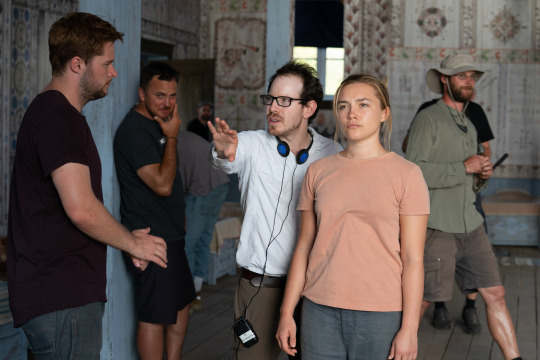
Jack Reynor, Ari Aster and Florence Pugh. / Photo: Merie Weismiller Wallace
Many in the Letterboxd community are raving about Midsommar’s stellar cast. Half the character work is achieved in those selections. Can you talk about where you first saw your actors and how you knew they were right for the roles? For a lot of the parts we had people tape and send in auditions, so it’s really a matter of instinct and feeling these people fit. In the case of Florence Pugh, Jack Reynor and Will Poulter, they were people who were at the top of our lists early on who we persisted on that they were right. It was a real joy to work with all of them. William Jackson Harper, too.
Florence Pugh can really do anything. She’s an incredible actress who’s wonderfully endowed with amazing talent. Will Poulter is a total professional and a brilliant actor. Vilhelm Blomgren was somebody we pulled on pretty late in the process and it was very exciting to find him and know we had our Pelle.
Bran asks: how different did Hereditary and Midsommar end up being from your initial ideas for them? They changed in the sense that what we ended up shooting were a lot longer than we could keep them, so the movies were cut down a lot. I feel both films are pretty close to what I was imagining. Midsommar was more ambitious and so there were more compromises, which is just what happens. You’re chasing this thing and you get as close as you can to your vision.
So then, given that Midsommar was significantly cut down, we’ll jump to Joshua Booker’s question: what was the hardest stuff to cut? There’s more rituals and we get to meet more people in the community to get a more nuanced view of them. There are more scenes between Dani and Christian so that their journey to that ending is a little bit more circuitous. There’s more of the thesis competition between Christian and Josh too, that originally had more body to it.
Right out of the gate your vision as a filmmaker feels fully formed. You’ve said that you intend to explore different genres. Do you want to continue working with cinematographer Pawel Pogorzelski, and do you plan on exploring different styles? I’m always interested in developing different styles but the style needs to fit the film. I’ve been working with Pawel for a long time—he’s one of my best friends and we understand how the other person works. We have a very satisfying shorthand and our own processes, which is great. I definitely plan on keeping on going with him.

Ari Aster with cinematographer Pawel Pogorzelski. / Photo: Gabor Kotschy
Everybody wants to know whether you’ve ever written a script, or a scene, or a short, and then thought “I’ve gone too far”? I admit have a problem with brevity. That’s maybe where I wonder if I’ve been a bit too indulgent, but not if I’ve gone too far with the taboos.
MaxT26 asks: do you think it’s important for modern horror films to push the boundaries in terms of being disturbing and creative? Related: Tobias Soar wonders what recent horror movies you’ve admired. There’s a tradition in horror of confronting taboos and twisting the knife, so to speak. The Wailing is a film I absolutely loved and already has a place among my favorite horror movies. I would describe that as a masterpiece.
I’m excited by South Korean filmmakers in general, by the way they approach storytelling and juggling of tones. Their films defy categorization while also tempting it. Later this year, we’re all going to get The Lighthouse. I wouldn’t necessarily categorize that as a horror film but I’m excited for people to see it. I’m a big fan of Robert Eggers. I saw an early cut of it and it’s great.
The final question/answer contain spoilers for both films. Read on at your peril.
You’ve mentioned building the script for Hereditary around the image of both Charlie and Annie’s deaths and the way they mirror each other. What image was your starting point for Midsommar? Some of the final images were certainly the things that came to me first. In particular, it was the image of the wide-shot with Dani and the house burning behind her. The prologue of the film came to me pretty early on too.
‘Midsommar’ is in US and UK theaters now, and coming to other festivals and markets soon. All photographs courtesy of A24. Our thanks to Ari for his time and to everyone who asked a question. Still not sated? Enjoy this Letterboxd list of Ari Aster’s favorite contemporary directors.
#ari aster#hereditary#midsommar#horror#filmmaker#toni collette#florence pugh#pagancommunity#sweden#pagan rituals#a24#a24 films#letterboxd#q&a
23 notes
·
View notes
Text
Writer’s Interview
Tagged by @galadrieljones! Her interview was fascinating and really informative; I would recommend you all check it out.
Tagging forward to @iarollane @charlatron @wardsarefunctioning @aban-asaara @thevikingwoman @athenril-of-kirkwall @fourletterepithet @oops-gingermoment @thunderheadfred @loquaciousquark @obvidalous@barddoc1992 and anyone else who wants to respond!
Q: What is your coffee order?
I don’t drink coffee. Tea for me, please!
Q: What is the coolest thing you’ve ever done?
The first thing that comes to mind is going to Iceland in 2016. Driving all around the island and seeing the fucking glacier lagoon Jökulsárlón was just.... breathtaking. I’ve never seen a place like that in my life.
Maybe another cool thing I did was finally find the balls to do a cosplay (a casual, lazy one, but a cosplay nonetheless) last year when I went to DragonCon in Atlanta.
Q: Who has been your biggest mentor?
Uhh, I don’t have any? But in terms of people who encourage me and help me keep my chin up in those moments of self-doubt (YA’LL KNOW THOSE MOMENTS), I would have to give thanks to @schoute, @viktuuri-fluff-saved-my-life @emileoutofit and @lylypuceonarchive, either for listening to my whining, leaving the most lovely comments and encouraging words, or both!
Q: What has been your most memorable writing project?
Stormbirds and Stalkers, my Aloy/Nil Horizon Zero Dawn fic, was probably the most memorable. I was OBSESSED with writing that thing to the point of putting out a chapter almost every day for the month it took to write. When I hear songs from the playlist I was listening to at the time of writing that fic, it takes me straight back to the feeling of loving that ship so much and being so into the writing that I was ignoring almost everything else (INCLUDING MY EXTREMELY PATIENT FIANCE). To this day, it’s my most popular fic.
In more recent memory, Damned Spot (the Fenris/Rynne Hawke bartender modern AU) is memorable because it has been incredible and inspiring to build the world with @schoute and to collaborate together with the fic and art. I’ve never worked together with someone on a project this way and it’s been so much fun.
Note, also, that I have a Master’s thesis and two published scientific articles under my belt, and those don’t even get an honourable mention in terms of memorable-ness. Fanfic writing defines who I am as a writer.
Q: What does your writing path look like, from the earliest days until now?
Uhh... Well, I guess I wanted to be a storyteller in some sense since I was a kid. I really used to love drawing, and the first thing I ever wanted to be was a comic strip artist. I used to make comic strips for myself from as early as I can remember until I was in high school. They largely revolved around stuff I wanted to happen in my real life (vacations I was looking forward to, boys I had crushes on in high school, etc.). REAL SCINTILLATING STUFF.
In terms of writing specifically, I’ve always been comfortable with writing. It was always just something I could do pretty easily without thinking much about it, but it was never really a creative thing or a thing I saw as a special talent. Friends in high school would ask me to edit their work, and I wrote an essay in grade 11 that a teacher said was “university level”. (I wish I still had that essay, actually. The thesis was that Sigmund Freud was a feminist. He really wasn’t, but I quite successfully argued that he was HAHAHAH.)
In university (undergrad and Master’s degrees), academic writing was just part of the work, so I just did it - again, without thinking much about it. Then I started working full-time and didn’t write anything really except for clinical notes and healthcare stuff for a couple years.
It wasn’t until I started writing fanfic in 2017 that writing became an actual creative process for me and something I recognized as a talent. It became a way that I could actually use my imagination - something I don’t feel like I had done since I was a kid. Fanfic has been the best and only way to express myself creatively; I never considered myself a creative person until I started doing this. So, I mean, I guess I’ve written things to some degree or another throughout my life, but I didn’t see myself as a writer until I started writing fanfic, and now it’s one of the skills I cherish most.
Q: What is your favourite part about writing?
Getting that perfect turn of phrase or dialogue between characters that encapsulates what I’m feeling or imagining for the scene. And when people comment and pick out those things that I was so proud of writing, that is just the cherry on the sundae.
Q: What does a typical day look like for you?
Wake up at 6:50am, eat breakfast, go to work and spend the day wishing I was at home writing. Go home, do a quick yoga session in my living room, WRITE WRITE WRITE until dinnertime which is anywhere between 8-10pm because my fiance and I are both Creative™ and thus Not Adherent To Regular Mealtimes™. Cook (or order in), eat dinner and watch a movie/show with the fiance, WRITE some more depending on the time, shower and bed around 1:30am. Rinse and repeat.
On weekends: wake up around 9-9:30am, yoga, breakfast, WRITE WRITE WRITE WRITE WRITE WRITE, with occasional irregular food breaks and poking around with the fiance to see what he’s up to (he’s a digital artist and filmmaker). Sometime around 8-10pm, cook (or order in), eat dinner and watch a movie/show with the fiance, WRITE some more depending on the time, shower and bed around 2-3am.
If we go out and do something during the day, or if I’m actively playing a video game, then obviously the writing time gets eaten into lol. Oh, I guess we clean sometimes too. Sometimes.
Q: What does your writing process look like?
I like to outline before I start a longfic; I like to know all the main points of the story and how it’s going to end before I get started. For individual chapters or oneshots, I also tend to outline the main points or main pieces of dialogue before getting into the meat of writing the chapter.
I listen to music CONSTANTLY. I actually can’t think unless there is music playing. I have playlists for all my ships. I often will pick one song that illustrates the feel of the chapter and listen to it on loop until the chapter is done.
Q: What’s the best advice you’ve gotten?
I’ve never really gotten any advice, so I’m going to paraphrase @galadrieljones‘ advice, since I naturally follow it and find it to be totally true: “Stay in the room. Once you’ve made the decision to write, don’t leave the room. If you leave the room, you’ll lose your momentum.” This is also the idea behind writing sprints - to force yourself to do nothing else but write for a set period of time, just to get those words out and stay in the moment of the writing. Yes, this might sometime mean I have spent 6 straight hours writing with only bathroom breaks, but those are often the days when I stop and feel like I’M THE MOST AMAZING HUMAN BEING IN THE WORLD because I got the damned chapter done.
Q: What’s the biggest lesson you’ve learned?
Similar to @galadrieljones‘ response, I would say that the most important thing for me has been to keep the writing for the pleasure of it and not to monetize it. I have been asked before if I would consider writing fiction professionally, and my answer is a resounding ‘no’. If I wrote professionally, I couldn’t write exactly what I want to write on my own timeline, and I wouldn’t be able to share it immediately and garner the kinds of interactions and socializing with my readers that I really enjoy. Fanfic is the perfect medium that lets me write exactly what I want and to hang out with fun like-minded people while doing so.
Q: What advice would you give someone who wants to start writing?
DO IT! DO IT DO IT DO IT!! I have so many friends who have said they want to write and don’t have the time or think they would be shitty at it - and I always say to JUST DO IT!! This also calls back also to some of the questions from earlier: if you really want to write, you may have to carve out time for it. MAKE time for it if it’s something you really want to do. Force yourself to find an hour or two and to fill it with writing instead of some other activity. If you really want to do it, you can and will find time for it.
#tag meme#tumblr game#fanfic writer's life#thank you for the tag!#this was a fun one to fill out!#pikapeppa reflects#ask me anything
19 notes
·
View notes
Text
Best Films of 2017, Part IV
We’re getting closer. Part I, Part II, Part III. GOOD MOVIES 42. A Quiet Passion (Terence Davies)- I think the biggest strength of this film, a pretty conventional one by Davies's standards, is a drive inward that is steady but not judgmental. Dickinson's retreat isn't treated as tragedy, but as a natural trajectory that was there in the first scene. (A lot of the heavy lifting is done by Emma Bell, the actress who plays young Emily with constancy.) The life of the mind is a lonely one, but there isn't much choice in the matter. The film moves along in a leisurely way, matching the long days of such privileged people, and it's funny until the bon mots drift into Frank Underwood territory that doesn't make sense. And the parts of the movie that don't work, the ones that succumb to the biopic mold, feel like that: told in the cadence of a joke but a bit empty. 41. Stronger (David Gordon Green)- For most of its running time, Stronger is a raw film bolstered by searing, sharply felt lead performances. It doesn't take the easy way out or succumb to cliche, suggesting that, gasp, maybe being a symbol for an entire city could be exhausting and frustrating. Then, quite quickly, it gives in to all of the cliches. The conversation with Carlos would have been an awesome deleted scene. 40. Split (M. Night Shyamalan)- Shyamalan flat-out knows how to make this kind of movie. It's not without its faults--can you even complain about his tendency to cast himself anymore?--but his cross-cutting game hasn't slipped a beat. The film is composed and patient, but it doesn't trespass the self-indulgent line the way that some of his earlier work does. Some of the abuse stuff is handled clumsily, but I suppose it has to match the touch of the psychology material, which can only be breezy and flippant. Here's what's different about the filmmaker's approach: Shyamalan hasn't guided many actors to great performances. (I guess Haley Joel Osment is still number one.) But this movie is James McAvoy's performance. He gets to have fun technically by switching back and forth among the personas, but the serious business is the fact that the whole thing's tone rests on his shoulders. Like many successful B movies, it has a fluidity that allows the audience to laugh at it, laugh with it, or be genuinely scared--sometimes in a span of minutes. If McAvoy hadn't gone all the way, the movie wouldn't have been able to.
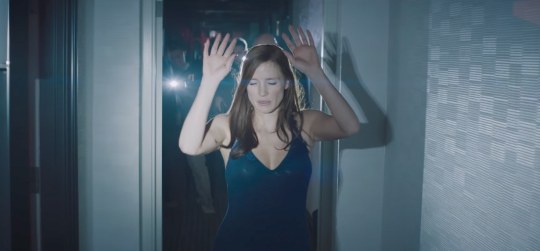
39. Molly’s Game (Aaron Sorkin)- This movie has a lot of the things that make me love movies. A scene in which someone flushes drugs down the toilet and hides valuables because the feds are coming. Self-effacing but rousing speeches that reference classic literature. An "I'm good for it" sequence dedicated to someone's gambling downward spiral. Cleavage. But all of the things I'm describing are window dressing, and this is maybe the first Aaron Sorkin screenplay that has more fat than meat, as tasty as that fat may be. The film's thesis shines in Idris Elba's strangely-accented monologue, the one that starts with "Is this what a RICO suspect looks like?" It seems to suggest that the world is indeed rigged against women, but it might be because they have more integrity than men, which makes it more difficult for them to succeed. It's an interesting notion, and the figure at the center of the film might be perfect to prove it, but there are so many flashbacks and scenes that feel obligatory to get us there. 38. Star Wars: The Last Jedi (Rian Johnson)- Good, if micro-managed in the way that a film-as-shareholder-commodity has to be. It's interesting to me that, though there are only nine movies that take place in this universe, the storytelling is more codified than any other genre I can think of. Even though it's less clinical than The Force Awakens, The Last Jedi has to jump through an inordinate number of hoops to be "a Star Wars movie." No matter how these are sold, they all have the same beats. That history is a gift in some ways. Even though we haven't heard from him in thirty-plus years, Jedi Master Luke's personality tracks in every way. It makes total sense how he would hold people up as symbols instead of personalities, and the movie benefits from the archetypes its predecessors have created. On the other hand, I think we spend thirty minutes on a mission that fails, and the movie hangs Finn out to dry. It's a sort of Empire mandate that the characters have to be separated from one another for the majority of the running time, and that makes for a strained middle section. I get that people like these movies because they're engineered and manicured for maximum pleasure, and I cherish the goofy bits like the drunk creature thinking BB-8 is a slot machine. Maybe these just aren't for me. Until I cry at the end. 37. Win It All (Joe Swanberg)- It ends abruptly and doesn't get as psychological as it could, but Win It All is designed for maximum pleasure. There are a few inventive gestures that make for a jaunty hang--I loved the superimposed counter that showed how up or down Eddie's bankroll was. Jake Johnson, who co-wrote, has real rakish chops. 36. American Made (Doug Liman)- It's helpful to compare this movie to T.C.'s summer disaster The Mummy, which cast him as a static rake. Doug Liman presents the same smiling mug, but he punches a few holes into the persona, letting us see the shortcomings of T.C.'s Barry Seal if not the delusional quality that the actual man must have had. (The movie tries to sell us on boredom as the main motivation for a near-suicide mission, but it was probably more complex than that.) The actor is at his best when he lets himself seems slightly dumb, when the audience is a few steps ahead of him. Luckily, that's the whole film. It helps that this is the first Liman movie since the original Bourne Identity to have a vibrant "stolen" quality to its visuals. American Made careens through its beats at a breakneck pace, and the biggest flaw of the movie is that it remains that fast at the end, when we need more answers. 35. Mudbound (Dee Rees)- A true ensemble, Mudbound has a deft hand with its own emotional effects. Dee Rees knows the moments that matter--the reunion of father and son after the War is unforgettable--and she nails them. The ending is a poignant culmination of a lot of momentum. Much of the film's success comes from real Movie Stars, Jason Mitchell chief among them, elevating their characters past types though. And some of them don't get there all the way. Jason Clarke's Henry is pretty much Unfeeling Man's Man Farmer and Jonathan Banks is totally Racist Pappy. (Not a joke: His character is actually called Pappy.) In the end, I can't help but suspect that similar characters and situations--he drinks to forget what he's seen!--haven't been staged better elsewhere.

34. Raw (Julia Ducournau)- These types of movies--by that I mean late New French Extremity, I guess--have to go too far. If they didn't, they would lose the perverse aesthetic high ground that they're all so smug about. So it goes too far, but I would like to show Raw to someone making, say, an X-Men movie because Julia Ducournau crafts more immersive world-building in twenty minutes than some of those movies do in multiple entries. The beginning was jagged, but when the storytelling settled into itself, it reminded me of Repulsion because the taboo that guides Raw starts out as a metaphor, then becomes a device, then becomes literal, and then it circles back around to metaphor. Maybe that journey is the reason it exists. 33. Get Out (Jordan Peele)- I saw this movie twice. The first time I was kind of cavalier about it. The line I said at parties was: “I personally prefer genre movies that let you attach social commentary to them. The subtext is the text here.” Knowing the film's secrets the second time around helped me to appreciate the performances better, especially in the powerhouse hypnotism scene. Kaluuya has to play an everyman but also, for obvious reasons, an everyman who stands out. The balance of vulnerability and heroism that he pulls off is impressive, armed with a fake-smile that is perfect for the micro-aggressions he has to stand and take. Chris embodies a civility that lets him stay in the house past his level of comfort, but he’s smart enough to insist on leaving when some horror protagonists would get illogical. I still think the film escalates a bit too quickly from suspicion to actual danger, and, man, I don't know what that TSA investigation tangent is doing at such a crucial moment. But I'll admit that I didn't give the film enough credit in February. Comedies of manners are common; horrors of manners are rare. 32. Logan Lucky (Steven Soderbergh)- From a screenwriting perspective, there are probably two schools of thought for heist movies. Approach A outlines every detail of the plan; that way, when the characters overcome their challenges, we are more impressed because we were warned of the dangers in advance. Approach B leaves the viewer in suspense, and the hurdles pop up for the viewer in a way that mirrors the characters' surprise. I prefer Approach A, and I think there's a degree of difficulty that can't be discounted there. In fact, there's a sort of joy of exposition that is unique to the heist genre and jives with Approach A. Logan Lucky operates mostly on plane B, and it frustrated me at first in what seems like a sterile, straight first act. But then, as I try to avoid spoilers, it goes so far past what we thought the heist would be, and it branches out into Soderberghian "what was actually happening during that time" territory. I had to re-evaluate my prejudices as I joined in on the fun. Despite the inevitable "What It Did Wrong" YouTubes that some killjoy will make, I didn't notice any narrative cheating. Daniel Craig is the eye in the zany storm. 31. The Big Sick (Michael Showalter)- I feel slightly diminishing returns with each super-autobiographical portrait of a comedian. As heart-wrenching as this one gets, it follows the beats that we're used to, right down to the rock-bottom argument with a fast food cashier. Cue the twenty different endings and the uninspired visual style. But why be a sour-puss when faced with a movie so sincere and eager to please? Besides keeping all of the subplot plates spinning, besides being fair to the female character, the film offers original moments and ideas. The triangle that emerges among Nanjiani, Romano, and Hunter authentically captures the way decorum frost melts once two generations realize their common ground. And "the movie that a guy shows a girl to test her taste on a third date" is something that I myself am guilty of, but I haven't seen it portrayed in a film. What isn't unique in the big structural picture is completely unique in certain moments. 30. The Belko Experiment (Greg McLean)- Its ending is only "good enough," but The Belko Experiment is my kind of ultraviolent trash. I would be perfectly happy if we could get the White Stripes of Experiment movies on odd years and alternate them with The Strokes of Purge movies on even years. For one reason or another, empathy machine John Gallagher, Jr. is still in his Hi, Mom! or Gang That Couldn't Shoot Straight phase. When he gets his Taxi Driver, watch out.

29. The Lego Batman Movie (Chris McKay)- I laughed twice during the opening production logos. Of course it devolves into everyone teaming up to save the city, as the straight versions of these movies do, but The Lego Batman Movie, especially in its lower stakes first half, was one of the funniest films of the year. I'm kind of thrilled that the satirizing of tropes I cherished from the margins in the '90s is now de rigeur, sponsored by the same studio that has shoved cliches down our throats. Will Arnett deserves special mention for inhabiting this specific version of Batman so well that he makes you rethink 70+ years of the character's make-up. It's no small feat. This movie, yes, probably counts as a slip-up of my superhero ban. I didn’t realize that until I was halfway through.
28. A Cure for Wellness (Gore Verbinski)- This is a difficult film to recommend because, if the person you're talking to cares only about story, he won't like it. It's strained and sometimes illogical, a "you can never leave" story that has been around the block a few times. But look out for the Miami Viceans on here when this film gets reconsidered for its visuals because, I'm telling you now, A Cure for Wellness has the most stately and controlled images this side of Kubrick. It's a perfect reference Blu-Ray if you still care about such things. Verbinski is credited with the story, and I doubt he told the screenwriter much more than "water, wrinkled faces, the color white," but he does some things with that sandbox that I haven't seen before. 27. It Comes at Night (Trey Edward Shults)- It Comes at Night never completely explains its own horror conceit of encroaching "sickness"; even by the end, there's a lot that we don't know about the apparently apocalyptic event that has singled out the characters. That presence of an absence is the film's greatest strength--it allows us to attach to the human frailty at the center without distraction. However, it's the film's greatest weakness as well because it's what keeps the proceedings small, like a cost-cutting measure. In capturing bleak human frailty, Trey Edward Shults knows exactly what he's doing. He uses literal darkness to suggest emotional darkness, and his script guides the viewer along character arcs without holding anyone's hand. A character uses the word "brother-in-law" instead of "brother" and, because of the context, it produces as much of a gasp as a gunshot would. I didn't recognize Riley Keough at first, which is an excellent sign for a young actress. There's a moment when her character catches another character eyeing her breasts, and she tugs her shirt with a unique mixture of flattery and shame. I can't wait to see what she does next. 26. Wind River (Taylor Sheridan)- If a movie has a scene of #RennerSeason making his own bullets, then my fingers won't let me give it lower than three stars. He's amazing/hilarious in this as the know-it-all spirit warrior--basically Steven Seagal in a better actor's body. He's perfect for squinting and selling lines like, "You keep looking for clues...but you're missing all the signs." Taylor Sheridan's screenplay is tight and meticulous in a way that we used to get all the time but feels special now. The backstory is doled out with care, and every character is rich enough to get a moment to shine. He shoots his own material with less visceral impact than someone like Denis Villeneuve did, but he does lend a specific sense of place to the film.There's a crucial late scene that sort of solves the mystery for us, making everything that comes after seem like falling action baggage. Your mileage may vary, but I'm not sure there are other ways to get across the information. I was okay with it. 25. The Post (Steven Spielberg)- The Post is a great time at the movies, but it's ultimately a bit too much of a movie for me. It has a hand-held lightness to its look, an energy that belies how quickly it was made. Streep's Kate Graham has a satisfying arc that eschews a lot of the grandstanding that this type of picture would normally lend her. Her lesson in confidence is laid on thickly, but Streep doesn't play it that way. Unfortunately some of the brusqueness I like in the filmmaking carries over to the screenplay. It offers few of the laughs-in-crisis that make individual Spielberg scenes so good, and most of the conflicts resolve themselves just a little too easily. ("I wonder if the guy I think has the papers actually has them...yep, after a few calls, I found out he does.") The less said about the cartoonish Vietnam protestors and the CCR needle-drop, the better. Overall, do I prefer the lean, realistic version of this story over the more belabored, showy version? Sure.

24. The Work (Jairus McLeary, Gethin Aldous)- The Work is undeniably raw, pure, and effective in the emotion it documents and generates. The access given to the filmmakers as they capture a group therapy program in Folsom State Prison is unbelievable. But for that reason, there's something on the margins of the film that feels exploitative and violating to me. I'm interested in how Bloods and Aryans console each other, not to mention how the most damaged figure is not a prisoner at all. But I get the sense I shouldn't be watching any of this. 23. Marjorie Prime (Michael Almereyda)- I like everything that this chamber piece specifies and everything that it decides to leave vague. The film is unsentimental, considering how sentimental this premise could be. It seems bent on reminding us, sometimes tragically, about how we shape our own memories until the original moment is gone in every way. I'll admit that it seems a little slight by the end, despite the weight suggested by what I just described. Even when it's surprising you, the film never writes in capital letters, and part of that feeling comes from bland visuals. But that's a small complaint for a film that is grappling so palpably with the challenges of authenticity in modern life.
3 notes
·
View notes
Text
Epic Movie (Re)Watch #171 - X-Men: First Class

Spoilers Below
Have I seen it before: Yes
Did I like it then: Yes.
Do I remember it: Yes.
Did I see it in theaters: Yes.
Was it a movie I saw since August 22nd, 2009: Yes. #104
Format: Blu-ray
1) Poland, 1944
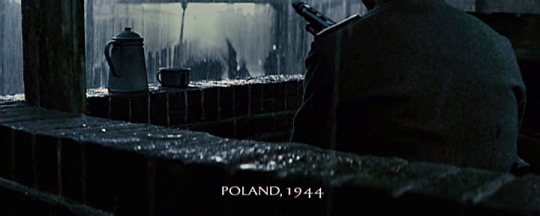
This film hemmed so close to the opening scene of the original X-Men film that producer Bryan Singer thought he was actually looking at the old footage. It is a smart and effective opening to the prequel, as it not only re-establishes a character who has been absent from the series for five years but also sets up his key conflict with the film. Erik is still dealing with the pain from this event in a much more key way than he is during Ian McKellen’s tenure; what he went through in the concentration camp is the driving motivation behind his actions in the film. Making this first scene all the better.
2) Young Charles & Raven.
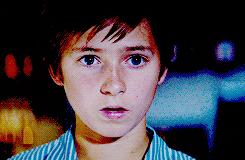
Raven [upon first meeting Charles]: “You’re not scared of me?”
The adoptive brother/sister relationship between Charles and Raven might be totally invented for this film (as in: has no source in comic book canon which I am aware of) but I freaking love it. I’m a sucker for platonic male/female relationships and the connection these two have is in a lot of ways the beating heart of this film. Which makes it all the more tragic that they drift apart in the future (something I’m hoping will be remedied in X-Men: Dark Phoenix). The key to their relationship is that they feel safe around each other. This is the first time that either of them has realized they’re not truly alone in the world. That someone hasn’t pushed Raven away for her natural form and that Charles realizes his ability to read minds does not make him a freak. There’s a sense of ease, comfort, and community they have with each other that was totally foreign to them up until that moment. A strong foundation to a strong relationship.
3) Kevin Bacon as Sebastian Shaw.
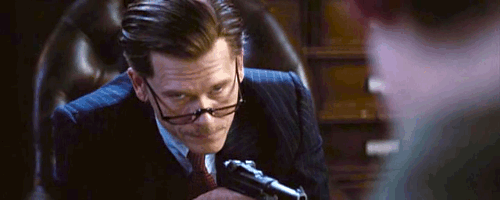
Bacon’s Shaw was all but glossed over in most promotional materials, making his presence in the film a pleasant surprise for first time viewers. And pleasant it is because Shaw is an absolutely wonderful villain. Bacon brings a refreshing and engaging amount of charisma/fun to the part. He’s the bad guy you love to hate with a little bit of Bond villain in him. The first thing he does when we meet him in murder Erik’s mother in front of her 12ish year old son. And then he reacts with unadulterated GLEE when that murder allows Erik to tap into his mutant powers. He’s downright giddy! In a series filled with classic bad guys like Magneto and William Stryker, Shaw is able to hold up with the best of them.
Shaw [after murdering Erik’s mom]: “We’re going to have a lot of fun together.”
4) James McAvoy as Charles Xavier.
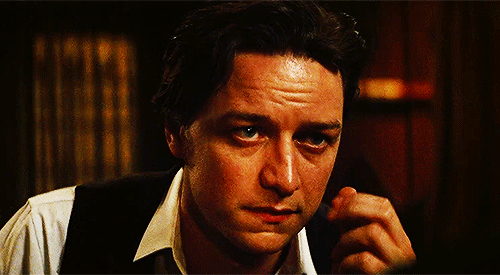
McAvoy’s Xavier is delightfully more flawed than Stewart’s. He is much more of a cad. He is more arrogant, a bit more green, a bit more cocky, and a lot more naive. BUT he’s not just that. He’s not some douche bag who learns to be a great man. You see the greatness in him still. He is still Charles Xavier after all. When things get serious, he gets serious. He lets Moira know how important this is to him, he has hope for the future of his people and he is able to put away the womanizer we meet early on when it comes to helping people. There’s still that naivety a little but, the belief that everything will be alright after they save the world. That fear will just stop. But it’s mixed in with Xavier’s trademark hope. McAvoy is great as the character and a joy to watch.
5) Jennifer Lawrence as Raven/Mystique.
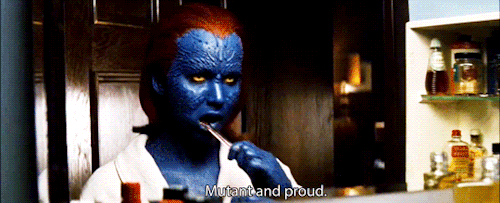
Raven is in a much different place than Rebecca Romijn’s Mystique was in the original X-Men trilogy and it’s a lot of fun to watch. There is this humor and warmth to the character that we don’t often get to see. A smile, a playfulness with Charles, but we see her develop into the more jaded warrior of Magneto’s crew. Watching that transformation is great and heartbreaking, especially as it shakes up her relationship with adopted brother Xavier. And Lawrence is great in the part. A pre Hunger Games role, I think it’s one of my favorites that she has under her belt. Many of her characters are so serious and dower these days when the actress has a wonderful heart/sense of humor she gets to show off her. It’s lost in the future installments, but that makes sense considering the path the character goes down. It’s a tragedy, but one that’s good to watch.
6) Oh Charles...
Raven: “Would you date me?”
Charles: “Of course I would. Any man would be lucky to have you, you are stunning.”
Raven: “Looking like this?”
[Charles stutters for a second then looks at Raven.]
Charles: “Blue? [Beat.] You’re my oldest friend...I’m incapable of thinking of you that way. I feel responsible for you.”
He changes from, “oh absolutely,” to, “I could never think of you like that,” REALLY fast when he realizes she’s talking about her natural form. And that’s where his naivety comes into play. He doesn’t understand what it’s like hiding who you really are in such a basic and obvious way. Not telling someone you can read their minds is fundamentally harder than having to wear a skin that isn’t your’s because you think people will reject your natural form. And that’s the key to her conflict in this film. Being mutant and proud.
7) McAvoy and Lawrence have such a wonderful natural chemistry as adopted brother & sister, must obvious in the scene above when Raven asks Charles if he’d date her. Her snuggling up to her brother while he reads her his thesis makes my heart melt.
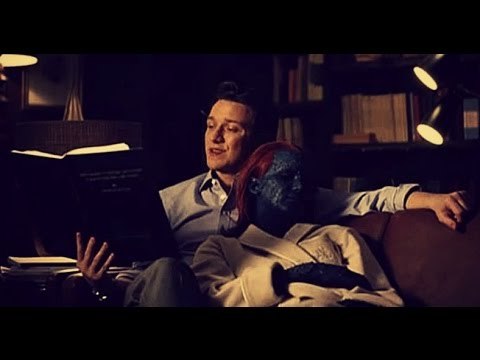
8) Michael Fassbender as Erik/Magneto.
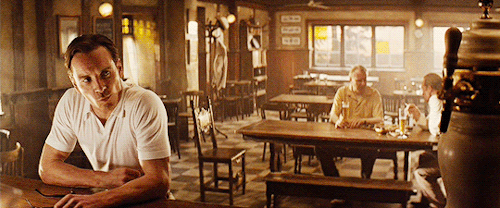
Honestly the casting of Erik & Charles could have been royally screwed up. This film does it perfectly. Fassbender brings a single determination and focus to his character. He is ruthless, brutal, violent, intimidating, but you still sympathize with him. Hell, you are ROOTING for him. In a lot of ways he’s even more sympathetic than Charles is. Fassbender is able to play the pain Erik has been though with much more relevance than McKellen ever got the chance to because the story allows it. He is in anger mode, with a bit of self loathing (he is what he is because a man murdered his mother, in his mind) but more with a taste for vengeance. Fassbender is absolutely beautiful in the part and I wouldn’t ask for a different actor to play him.
9) Of course within one minute of meeting Rose Byrne’s character she is strips into her underwear because, hey, sexy women get objectified in film!
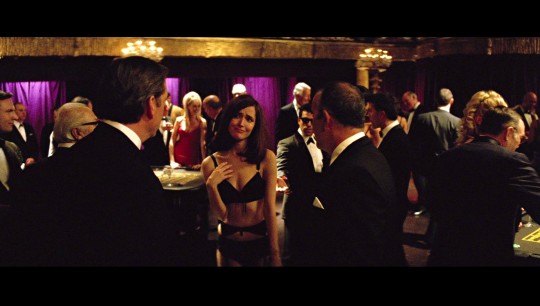
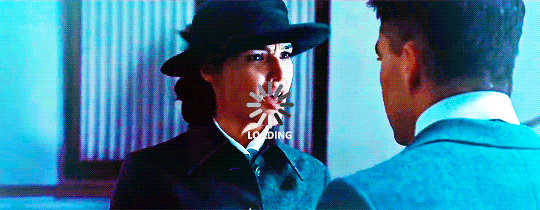
(GIF originally posted by @chirrutimwae)
Yes, I understand that the Hellfire club is like a sexy lingerie strip club thing. Yes I understand that Moira is a determined CIA agent who will do her job no matter what. And yes this is the only time Moira does this and she’s actually a pretty great character. But you know what? The Hellfire club did not NEED to be a sexy lingerie strip club. It could’ve been some elegant hoity-toity how do you do thing. And Moira didn’t need to strip down to her lingerie at all in the film. It was not needed. It does not tell us anything about her character or the story.
Ugh, living in a post Wonder Woman world is going to be a lot harder than I thought. I mean, I wasn’t exactly blind before. But I definitely needed glasses to see through the haze which is the male gaze and now I do with Wonder Woman. And now it’s just...oh boy.
10) Rose Byrne as Moira is a solidly written character that the actress plays well. The filmmakers don’t spend much time focusing on the, “Moira in her underwear,” stuff and she turns into pretty much the best government agent in the film. She is intelligent, more focused on the job than any of her coworkers (who are dogged down by fear, bigotry, and male ego), and she forms this nice relationship with Charles which yes ends up romantic but is also more based on mutual respect. I love couples with mutual respect for each other. Rose Byrne plays the part wonderfully. I love the actress now BECAUSE I was introduced to her in this film. She is capable, strong, but not pigheaded or egotistical. She’s good at her job and she knows it so she continues to be good at her job.
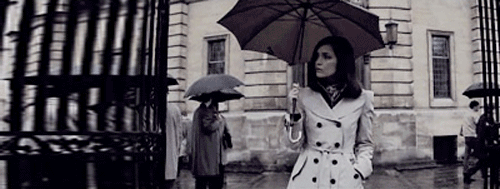
11) January Jones as Emma Frost.
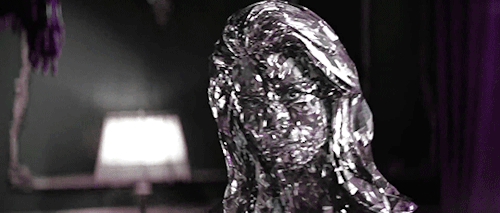
So I know there is a lot of hate out there for January Jones as Frost, but I don’t really mind her. But I’m not going to like strongly defend her either. I put more blame on the writing than her as she works with what she is given. Emma Frost is this badass in the comics who - yes - dresses in a VERY sexual manor (because she likes to, I believe) but she is also wonderfully complex. She usually has an intense rivalry with Jean Grey, is often romantically linked to Scott Summers, is an extremely powerful telepath, reformed bad guy who is often not so reformed, and over all fascinating read. But the filmmakers sorta just latched onto the, “sexy female bad guy with diamond skin and telepathic powers.” Which would’ve been fine is Emma had been developed a bit more but she never really goes beyond that/Shaw’s hench woman.
And again, the power of Wonder Woman has me asking: why is she dressing so sexually? I mean if there’s like a legitimate reason, like the character is more comfortable with that or confident in her body, than go for it! But a reason is never given she just does that and it seems to be for the sake of the male gaze. Which is disappointing to say the least.
12) The scene which I (and Henry Jackman’s score) refers to as Frankenstein’s Monster.
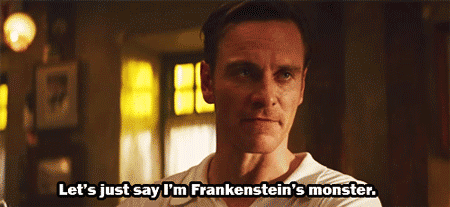
This is Erik at his most brutal. He finds those two “former” Nazis (can you ever really be a former Nazi if you’re not repenting for your sins?) in a bar and engages in conversation with them. It’s incredible tense in the most wonderful sense, because Erik is enjoying screwing with these Nazis. And then he cuts them down in the most brutal and badass way possible in a wonderful (and wonderfully simple) moment of action supported by Henry Jackman’s incredible score. I am very much enjoying any and all forms of media where Nazis are absolutely wrecked so this has is even more enjoyable now than it was in 2011.
13) The blonde Charles with looked familiar to me...
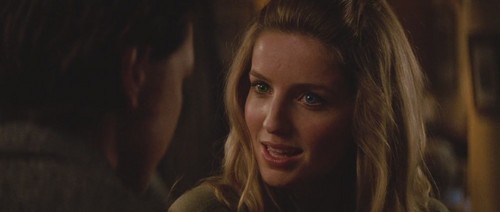
Then I realized she’s Annabelle Wallis, who is in The Mummy with Tom Cruise.

As of writing I have yet to see the new Mummy film so I don’t like or dislike this actress. Just noticed it.
14) When I first saw this it took a second to sink in.
Charles [to the CIA agent who accused him of doing a magic trick]: “No agent Stryker. Although I could tell you about your son William...”
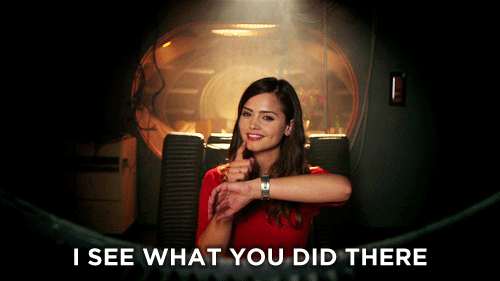
15) Oliver Platt as the Man in Black.
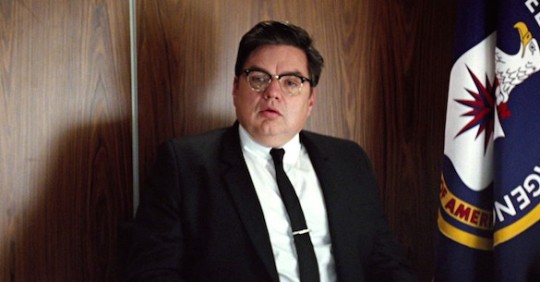
I enjoy Platt’s performance in this film. He’s not your typical government stooge to keep the heroes in line. He’s like a kid at Christmas. All these years he thought the impossible wasn’t so impossible and now he has proof. And he’s super excited about that and helpful because of it. He’s just a wonderful addition to the film.
16) According to IMDb:
A telepathic battle between Professor X and Emma Frost was going to be in the film, but upon the release of Inception (2010) the concept was scrapped. This was then used in X-Men: Apocalypse (2016), between Professor X and Apocalypse.
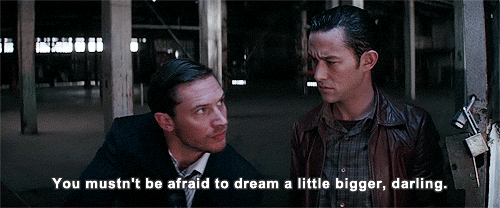
17) So let’s consider Charles and Erik’s first encounter, shall we:
Charles jumps in to save the life of a man he doesn’t know.
Charles helps Erik to calm down and find peace because he doesn’t like him to be upset.
And of course, this:
Erik: “I thought I was alone!”
Charles: “You’re not alone, Erik. You’re not alone.”

Yes this is a strong first interaction between what will be the bromantic frenemy relationship of the century, but more so than that it plays into some strong conscious gay subtext feature in the film. Like in X2 when Bobby came out to his family as a mutant, there are small but important lines between being a mutant and being gay. Two lines stand out in particular: the one above and then...
Hank [when he’s outed as a mutant]: “You didn’t ask so I didn’t tell.”
X-Men have traditional been used as a parable for those fighting for their rights in those world (specifically America). When they were first being published there was a strong line between Professor X & Martin Luther King Jr. as well as Magneto & Malcolm X. But as times have evolved, so have the X-Men. With a number of LGBTQIA actors and characters in the franchise, in the 21st century X-Men has at times strongly paralleled the issues gay people face in this world. Particularly through Hank’s, “don’t ask don’t tell,” line and Erik’s, “I thought I was alone.” Gay visibility was not as much of a thing in the 50s as it is in 2017, and it was in the 60s when things like the Stonewall Riots occurred giving gay people much more visibility. This film is set in the 60s.
18) Nicholas Hoult as Hank McCoy/Beast.
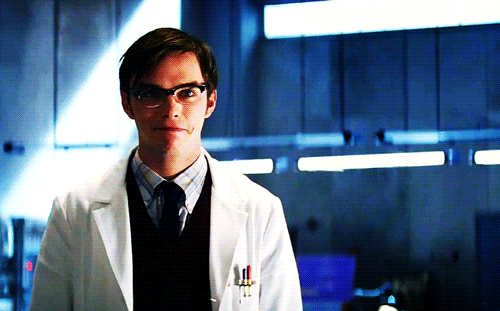
Hoult brings a lot of heart to the character originated brilliantly by Kelsey Grammer in The Last Stand (Hoult even watched early episodes of “Frasier” to see if he couldn’t emulate Grammer in any way). He features the same intellect as Grammers’ Beast but is a lot more soft spoken. He has not made peace with the animal side of himself yet or who he really is. Like Raven, he needs to learn to take pride in his status as a mutant. He just gets there in a different way than she does. This was the first film I saw with Hoult and I have to say I’m glad for it. Because I think he’s a talented actor who was able to make the role of Hank McCoy remarkably memorable.
19) There is also a notably strong chemistry between Nicholas Hoult and Jennifer Lawrence. It isn’t like Emma Stone & Andrew Garfield in Amazing Spider-Man where you can see them getting hot just by being near each other, but it’s incredibly cute and adorable. There’s a natural back and forth between the pair, a natural trust which means we as the audience are invested in their blossoming relationship as well.

20) While I personally think the relationship between Charles and Raven gives the life its heart, that is not to undersell the intense importance Charles/Erik’s relationship is.
Erik: “What do you know about me?”
Charles: “Everything.”
There is this immediate vulnerability Erik has with Charles which he is NOT comfortable with (since in the past he’s been vulnerable under the worst possible of situations), but Charles doesn’t manipulate Erik with the knowledge he has. There’s an immediate depth of feeling the future Professor X has for his new ally. He wants to make sure he’s okay and the fact that he doesn’t take advantage of Erik’s vulnerability is something Erik is not used to. Meaning Erik trusts Charles more than he has trusted anyone ever before and Charles is able to help Erik reach his full potential as Magneto.
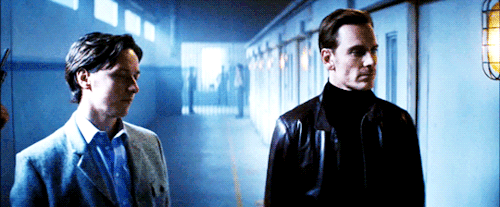
21) I laughed SO hard at this line the first time I saw the film.
Hank [when he hooks up Charles to Cerebro]: “Are you sure we can’t shave your head?”
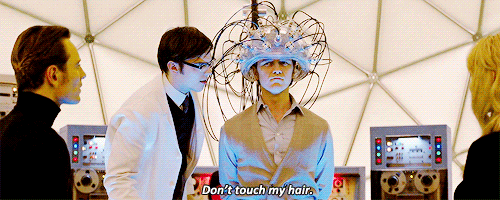
(GIF source is unknown [if this is your GIF please let me know].)
22) The montage where Erik and Charles find all the mutants to make up the first X-Men team is a slick way of covering a sequence which could have easily dogged down the pacing of the film. Instead, “okay, we need to find Angel and Havok and Darwin and Banshee...” they just cover it in about five minutes with upbeat music and clever pacing/editing.
23) The gay subtext in this film COULD have been much more obvious if they had kept this deleted (where Charles shows off his powers to angel):
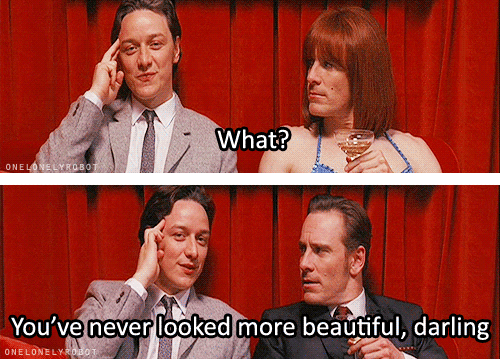
24) This is beautiful.
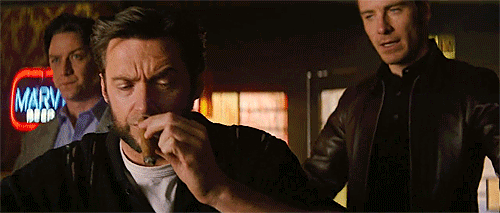
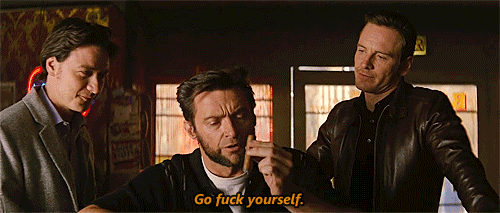
(GIF originally posted by @littlerebelrabbit)
According to IMDb:
Hugh Jackman accepted the opportunity to cameo as Wolverine, when he learned he would be the only character in the film to use the word 'fuck'. He improvised the line, "Go fuck yourself," after using seven other takes to say, "Fuck off". The reaction from James McAvoy and Michael Fassbender to the different line was authentic.
My entire process while watching this scene the first time was, “Hey, that guy looks familiar. Huh, he kinda looks like Hugh Jackman. Hey wait, that IS Hugh Jackman!” This is by far one of my favorite cameos in a film EVER and his appearance makes Hugh Jackman the only actor (to date) to appear in every film with the words X-Men in the title (he didn’t appear in Deadpool so he hasn’t appeared in every X-Men universe ever).
25) I mentioned in my recap for The League of Extraordinary Gentlemen that Jason Flemyng is one of my favorite character actors because of that film. Well he fills out Azazel’s red skin quite nicely.
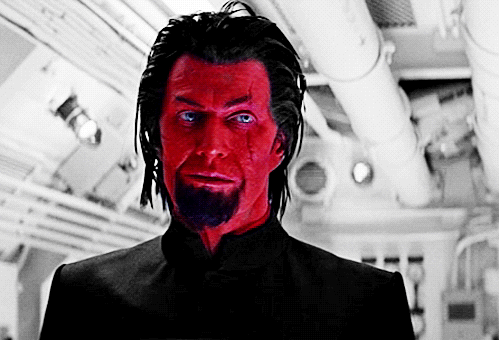
26) Charles and Erik’s scene at the Lincoln Memorial is very telling of their future rivalry.
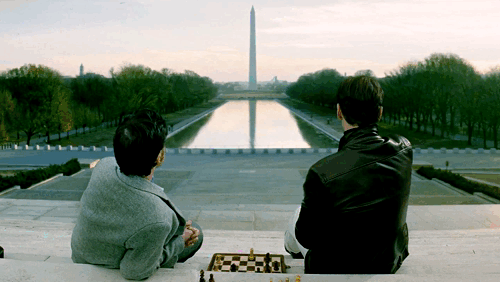
Erik: “Identification: that’s how it starts.”
This is where Erik’s naivety truly shines through. He actually believes he can convince humans to not be afraid of what they don’t understand, collectively. While Erik’s output might be a little more dower it’s also a little more realistic.
27) The bonding scene between the young X-Men is great.
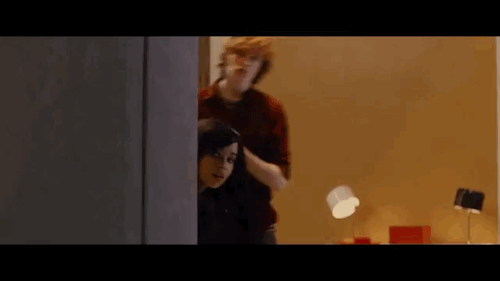
I’m a sucker for superheroes screwing around with their powers as a way to bond with each other (see: the party seen in Age of Ultron). There is strong humor throughout, each character is developed in simple yet unique ways and we begin to understand their relationships with each other. And it’s just a lot of fun to watch!
Note: I really like Zoe Kravitz in this film, but I think that speaks to her natural charisma more than anything else.
28) Professor Xavier is a jerk.
Charles [after he finds his new mutants comfortable with their powers, screwing around like the young people they are]: “I expected more from you.”
29) The way Erik tears through the Russian guard to get to Frost (and, by extension, Shaw eventually) shows how determined he is. He is ruthless and if anyone actively stands in his way he will tear them apart. It’s simple but powerful. The way he handles Emma also shows off this dedication, as well as the dissonance between how far he’ll go versus how far Charles WON’T go.
30) The “Children of the Atom” scene which showcases Shaw’s plan is nicely effective. It has a unique and impactful visual style and its simple enough that the audience isn’t dogged down by unnecessary exposition.
youtube
31) Shaw’s attack on the CIA is an incredibly strong turning point for the film. Outside of what’s been going on with Erik, the darkness of previous X-Men films has pretty much taken a backseat in this film. Until this moment. It’s when everything turns to shit, giving an unfortunate end to Oliver Platt’s character and showcasing Shaw’s powers in a unique and threatening way. The few issues I have with this scene are:
I wish we got more in Angel’s head about her decision to join up with Shaw; she does so then her character kind of disappears. It’s like she’s his new Emma.
Even in 2011, the black guy dies first.
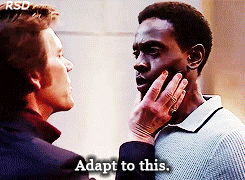
32) My brother and I both made this joke the first time we saw this film, so thanks to @jakegyllenhaal for putting it in GIF form.
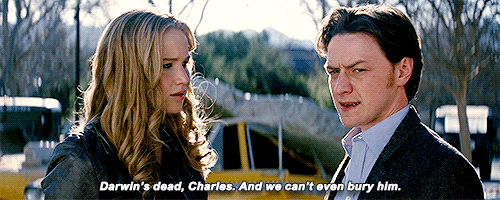
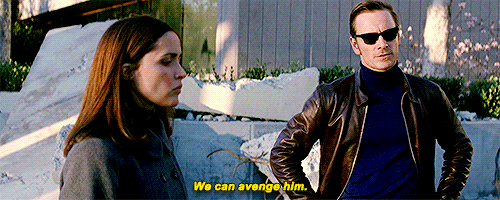
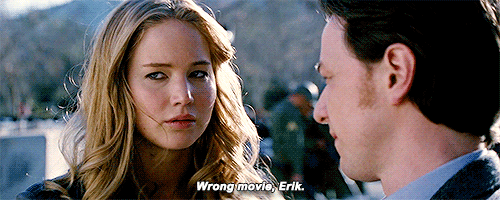
33) Okay, I might be about to get philosophical here.
Stryker: “In times like this, SECURITY is more important than liberty.”

(GIF source unknown [if this is your GIF please let me know].)
This is an issue in today’s modern age, but here’s the thing: liberty is more important than safety. Above all. “Give me liberty or give me death,” is a famous line that is basically one of the things this country is built on. So no, Security is NOT more important than liberty. Liberty and freedom above all. And if you have to compromise on security to do so than you should. At least, in my opinion.
34) X-Training.
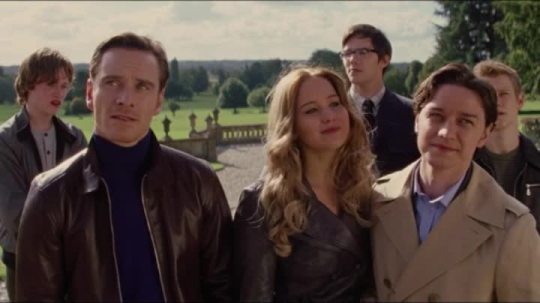
This is - in a lot of ways - what I’ve missed from the X-Men series. Charles actually being a teacher. Actually seeing the X-School in work and seeing students learn to master their powers. You know why Harry Potter is so cool? In part, it’s because we like to imagine taking all the classes. And now we’ve finally get that. It shows Charles being more of a teacher and growing into his role of Professor X more which is wonderful. Also - like the recruitment scene - the montage format is great. The editing and music keep it from dragging down the film. We could easily have spent like, “okay, two minutes on Beast now two minutes on Havok now two minutes on Banshee,” etc. But the montage makes it like a music video. Easily digestible, supported by Henry Jackman’s score, and just a lot of fun. Each character’s development is also continued, making them unique individuals who’s relationships with each other and personalities we understand. It’s just really great.
35) Glad to see they’re trying to maintain SOME continuity with the series.
Hank [about Raven]: “When you’re 40 you’ll still have the looks and sights of a teenager.”
36) Rage and serenity.
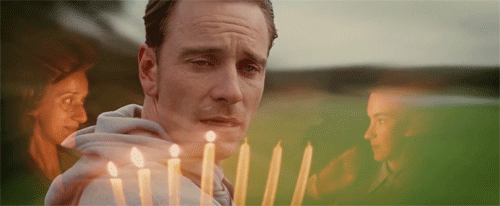
This is the moment of greatest trust and vulnerability Erik has with Charles. Erik trusts Charles enough to let him go through his mind and find his most intimate memory with his mother. It’s a holiday I assume (that’s a menorah so I’m thinking Hanukkah as Erik IS Jewish) and it’s this beautiful memory of someone he misses more than anything else. And it shows Charles who Erik is. It is the strongest moment in their entire relationship and defines it’s better qualities in a lot of ways. It’s pure character and I love it for that.
37) Hank and the cure.
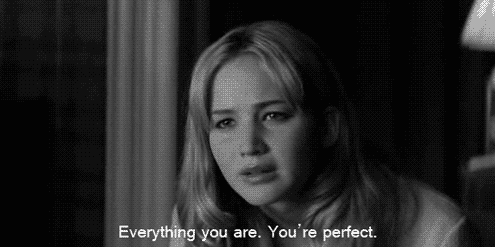
(GIF source unknown [if this is your GIF please let me know].)
There’s a strong juxtaposition between where Hank is with his self worth and Raven. Magneto has convinced Raven that she should be mutant and proud, that she should embrace her natural form. And she tries to do the same. It doesn’t exactly work though.
Hank: “My feet and your natural blue form will never be deemed beautiful. [Raven changes her skin back.] You’re beautiful now.”
Dude, you just said the girl you like will never be beautiful unless she looks like someone else. And I get that you’re projecting your own issues onto her, but also you’re words hurt her so much that she instinctively goes back into hiding.
Aka: the moment Hank and Raven would not get together (as of now).
38) Charles and Erik playing one last chess game before going to stop Shaw.
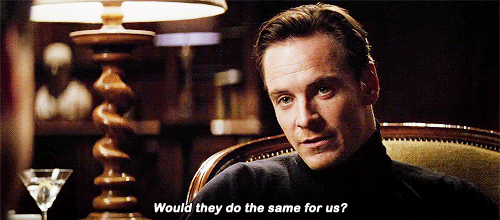
It is widely foreshadowing of the conflict to come between the pair and an unfortunate piece of dramatic irony for us as the audience. It is the showcase of the dissonance in their relationship at its most basic.
Charles: “Killing Shaw will not bring you peace.”
Erik: “Peace was never an option.”
That is just not applicable to Shaw for Erik, but humans as well. He’s not interested in peace with humanity, he’s interested in supremacy. As we saw in 2000′s X-Men.
39) Mystique seducing Erik always felt a little off to me. I know she’s mad at Hank and that Erik is the only guy in her life right now to make her feel totally comfortable with who she is (along with helping her be mutant and proud) but it feels a little unearned. I don’t get any sexual chemistry between them. I see a nice relationship but not a sexual one. Maybe it’s just me. But the Rebecca Romijn cameo is appreciated!
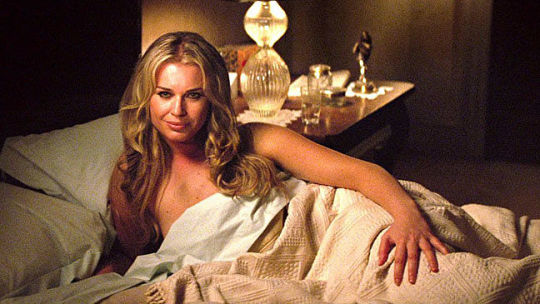
40) Hank’s gone into Beast mode.
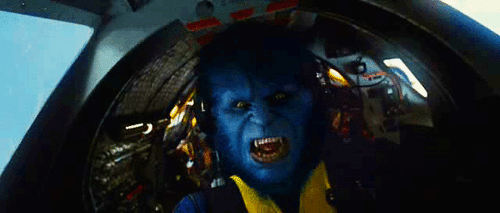
The practical makeup to get Hoult looking like the blue beast is incredible, because it IS largely practical with a bit of CGI to help enhance some areas. You begin to see a bit more of Kelsey Grammer in Beast now which is fun, but Hoult still makes the role his own. This is what helps him accept the animalistic instincts in him and reach the status of mutant and proud. It’s a great part of the film.
41) Now I’m just thinking about the first X-Men...
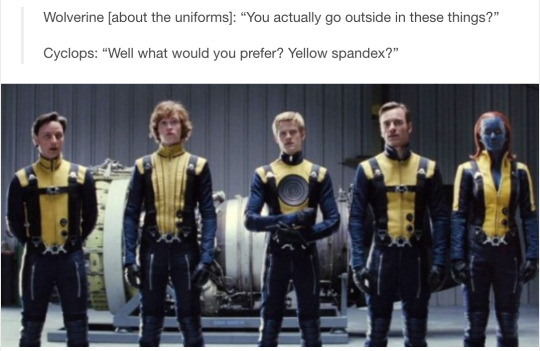
42) The climax of the film not only shows the team working well together but has some nice surprises in it (mainly when the Russians blow up their own ship). It’s best seen when the team find Shaw’s submarine and Erik says he’s going in. Charles does not question or second guess his teammate’s decision but works with it and sends him back up. It’s a lot of fun to watch this team in action.
43) Erik and Shaw’s final encounter.
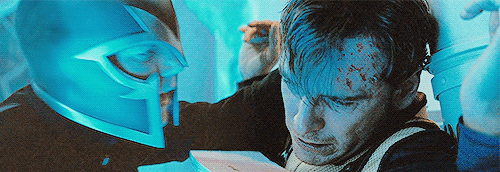
For most of this scene Erik is silent, just letting Shaw rail on him because it allows Erik’s telepathy to feed through. He says nothing until he’s about to be in control which takes a lot of self discipline.
Erik: “Everything you did made me stronger...That’s the truth. I’ve known it all along.”
And then what Erik says right before he kills Shaw is INCREDIBLY powerful especially when you think of the path Magneto goes down.
Erik: “I agree with every word you’ve said. We are the future. But unfortunately, you killed my mother.”
The way Erik ends up killing Shaw is so cruel and dramatic then, with the mirrored cinematography on Charles’ head (as he’s in Shaw’s mind) just driving the point home. He’s not just killing Shaw. He’s killing any kind of platonic relationship he could have with Charles too.
44) And so Erik’s transformation to Magneto is complete.

He is now the mutant leader we know from the first film, with his powers under full control. Now that he’s done with revenge he can move on to freeing his mutant brothers and sisters. He’s embraced not just his powers but his role as a leader of mutants and an enemy of mankind. And he’s tired of being vulnerable.
Charles [about the US and Russians Erik is about to kill]: “They’re just following orders!”
Erik: “I’ve been at the mercy of men just following orders.”

(GIF source unknown [if this is your GIF please let me know].)
45) The ensuing fist fight between Charles and Erik could have easily been based around powers. Charles could have used his telepathy to control Azazel or Angel or someone and send them in to fight Erik with him using his metal manipulation to throw them off. But you know what? Seeing this too just get in a freaking fist fight is much more realistic for their relationship, a lot more raw, and a lot more entertaining.
46) Well, if this isn’t a declaration of platonic (???) love I don’t know what is.
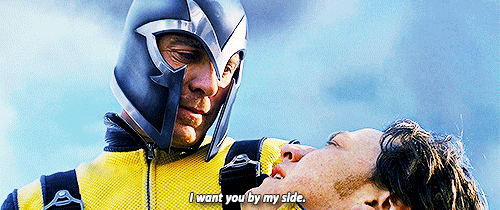
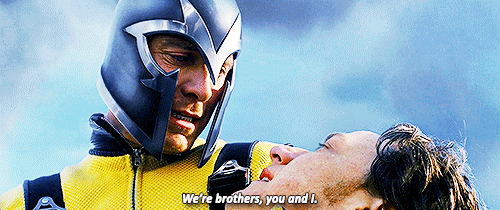
(GIF originally posted by @marveladdicts)
47) It’s nice to see Mystique not go straight for Erik to join him but to make sure that the person who is practically her brother is alright. And then Charles encourages her to go with Erik! It’s still a strong relationship even if it is in tatters.
48) Charles likes to fuck with people’s minds without consent. What he did to Jean in The Last Stand and now getting rid of Moira’s memories without even asking.
49) Oh man.
Moira [talking about things she half remembers]: “A kiss.”
[Room full of male CIA agents groan.]
CIA Agent: “Gentlemen, this is why the CIA is no place for a woman.”
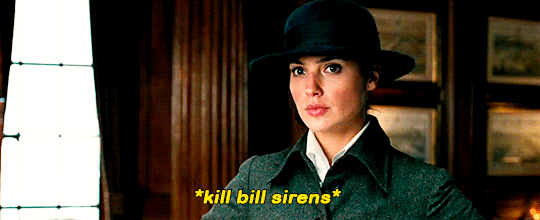
(GIF originally posted by @manofsteel)
50) The ending to this film is very solid, with Erik not only embracing his role as Magneto but also the fashion choice.
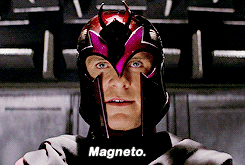
(GIF originally posted by @wonho-kihyun)
X-Men: First Class is an incredible amount of fun. Matthew Vaughn’s directing style gives the series a boost of adrenaline it desperately needed. Supported by memorable characters, a strong story with strong themes, and absolutely amazing performances almost across the board, this is the reason we still have X-Men films today. An absolute treat for first time viewers and old fans alike, you all should watch it.
#X Men First Class#X Men#Michael Fassbender#James McAvoy#Jennifer Lawrence#Epic Movie (Re)Watch#Zoe Kravitz#Oliver Platt#January Jones#Rose Byrne#Nicholas Hoult#Hugh Jackman#Matthew Vaughn#Kevin Bacon#Rebecca Romijn#Jason Flemyng#Annabelle Wallis#I See What You Did There#Loading
117 notes
·
View notes
Text
The Weekend Warrior 6/18/2021 - THE HITMAN’S WIFE’S BODYGUARD, THE SPARKS BROTHERS, LUCA, 12 MIGHTY ORPHANS, FATHERHOOD, RITA MORENO and More!
Well, it’s another week and another column and now I’m not only trying to stay on top of Emmy stuff for Below the Line, but I’m also desperately trying to see stuff for the 20th Tribeca Festival AND still having time to watch stuff for the column. As Nancy Meyers might say, “Something’s Gotta Give.” (Well, maybe she said it when someone asked her the title of her next movie in 2002. Shut up.)

But first, this week’s “The Chosen One” and how could it be anything but Edgar Wright’s THE SPARKS BROTHERS (Focus Features), which I’ve now seen three times maybe?
To talk about Sparks, you almost have to remember the first time you heard of Sparks, and for me, it was in the early ‘80s when I was getting hipper into music and record collecting, and I’d see the covers of their records with their punny titles and be like, “What is this?” But those covers also scared me in some ways. Oddly, the “alternative rock” station WLIR should have been playing the hell out of Sparks in the ‘80s but other than “Cool Places,” their duet with the Go-Go’s Jane Wiedlin, they went mostly ignored.
It wasn’t until I saw them on Saturday Night Live performing “Mickey Mouse,” and I was immediately fascinated by keyboard player Ron Mael’s stage presence, standing completely still and stoic while his brother Russell pranced around the stage like a true rock star. Over the years, I heard covers by bands like the Dirtbombs and the Dresden Dolls, but it wasn’t until I watched the movie did I realize the influence they had on early new wave bands like Duran Duran, Erasure and Depeche Mode.
In many ways, there’s no one more perfect to direct this documentary other than Wright, since the Maels have been so influenced by cinema and their work with auteur filmmakers, some endeavors more successful than others. And then of course, Wright, has this amazing encyclopedic knowledge of music, as well as being so connected to that world that he can get the likes of Beck and Flea and others to go on camera to talk about the band. This is one case where the veritable Who’s Who *IS* a veritable Who’s Who. The number of actors and artists who come forward to share their stories about Sparks is quite amazing to the point where there’s almost a “Holy shit!” moment every couple minutes. “There’s two of New Order! And two of Duran Duran!” (Is there ANYONE Edgar DOESN’T know?)
More importantly, he gets Ron and Russ to talk at length about their entire career, almost album by album -- and they’ve made 25 of them! -- and it even covers the band’s leaner years in the 90s
All the interviews are done in black and white, almost as the perfect contrast to the colorful stories they tell and the similarly colorful music videos that punctuate those stories.
I mean, if Wright was writing a thesis paper on the influence and reach of Sparks, then he’d get an “A.” But then that still bodes the question: Are Sparks loved because their songs can be weird or have such a strange sense of humor? Well, They Might Be Giants, probably one of the most obvious influences, has never mentioned Sparks’ influence before, as far as I know, although, they, too, win over fans with the charm of their humorous songs. Even when you think of other groups of two members like the Black Keys, Sparks were doing that first, as well.
I couldn’t tell you if The Sparks Brothers will turn the brothers Mael into the global superstars selling out stadiums they’ve deserved to be for many years, but I know it’s going to be a LOT tougher to get tickets to see them the next time they tour between this and Leos Carax’s Spark-written musical Annette later this summer. Wright’s documentary is the definition of comprehensive.
I’m honestly not 100% sure how wide Focus Features is releasing this movie, but I figure it will be in 500 or 600 theaters, which would be a great way to get word out about the band. I’d love to see Wright’s fans go out to see it and for it to make a million or two this weekend, as that wouldn’t be bad for any documentary, especially with so many going straight to streaming these days.
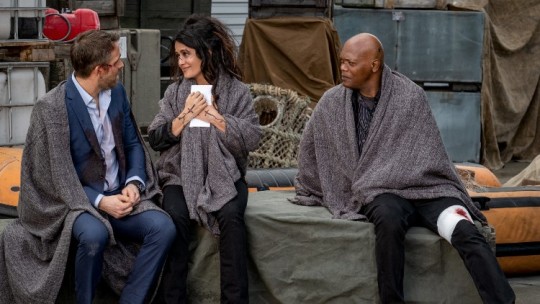
Let’s get to the single wide release of the week, which opened on Wednesday (something I completely forgot), and it’s THE HITMAN’S WIFE’S BODYGUARD (Lionsgate), the reunion of Samuel L. Jackson (as the hitman), Ryan Reynolds (as the bodyguard) and Salma Hayek (as the hitman’s wife). See how all of that works? The action-comedy sequel hopes to capitalize on the success of the first movie, which was #1 for an amazing three weeks in the late summer of 2017, grossing $75 million in North America alone.
The sequel opens at a very different time when a $21.4 million opening (like the original movie) wouldn’t be bad, but can THWB make that much at a time when people are being very precious about what they see in theaters? At least this one, unlike last week’s In the Heights -- which made less than half what I predicted -- is not debuting on streamers so if anyone wants to see it, they will have to go out to theaters, but why would they want to see it?
I already reviewed this at Below the Line, and I guess I liked it more than a lot of critics, because it’s currently at 30% on Rotten Tomatoes, which is very, VERY bad. That’s an even lower rating than Samuel L. Jackson’s last movie with Lionsgate, the horror sequel Spiral: From the Book of Saw, which bombed last month, opening with less than $9 million. So yeah, people may not rush out to see it for Jackson, but it’s been a very long time since there was a movie from Ryan Reynolds, and he’s definitely more of an A-lister thanks to the Deadpool movies. In fact, it’s been two full years since Reynolds was in Detective Pikachu, which grossed $144 million domestically, mostly with his voice role. Reynolds also provided a voice in The Croods: A New Age, one of the first movies to open theatrically during the pandemic that grossed $58 million.
It’s really hard to gauge how THWB will do under pandemic rules, even as places like New York City have thrown off all COVID limitations, so that theaters should be allowed to be full again? Will that matter? After the last few weeks, I feel like I should go lower on this one, closer to $15 to 17 million. I’m not sure if most people will even realize this opened Wednesday, but people are still figuring things out, and I’m not sure the original movie is as beloved as three times at #1 might convey.
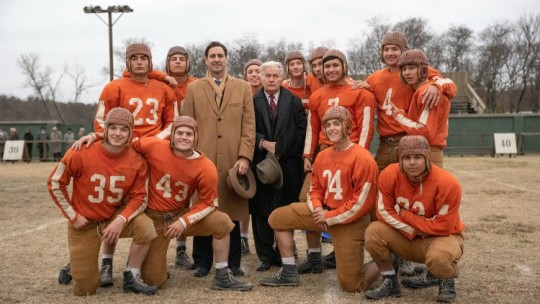
Also expanding nationwide into about 800 theaters is 12 MIGHTY ORPHANS (Sony Pictures Classics), which I wrote a little about last week when it opened in 120 Texas theaters, although I hadn’t actually seen it at that time. Well, I’ve seen it, and I have to say that it’s a perfectly pleasant period underdog story that I actually enjoyed more than George Clooney’s wacky Leatherheads, which is set around the same period.
Again, it’s not a particularly groundbreaking story, showing how Luke Wilson’s Rusty Russell takes a rag-tag group of orphans from the Masonic Home orphanage in Fort Worth, Texas, and not only teaches them how to read and do math but also how to play football in the early days when very few of the current plays existed. If you’ve seen any of these types of movies before, then you probably already know how it plays out, and though I try not to be cynical, especially with the over-the-top villainy of Wayne Knight’s cricket-bat wielding abuser, I do think this offers one of Wilson’s better performances, and I enjoyed seeing Martin Sheen in a strong supporting role as well.
Even knowing full well that most of the conflicts the team faces will probably be the kind of “5-minute drama” that will be resolved soon enough, it’s still enjoyable to watch such an inspirational story that one can probably forgive some of the cliches of the genre that keeps the film’s last act from elevating itself above the obviousness last act. (When it decides to show what happened to every single person in the movie during the end credits, you could hear the sound of my eyes rolling.) This might appeal to those looking for something a little less snarky or cynical at a time when that’s the norm, but true cinephiles will rightfully snub their nose at those cliches, because this feels like one of those sports movies that tries to win audiences over by not veering too far from what has worked previously.
Even expanding into 800 theaters this Friday, I’m not sure 12 Mighty Orphans will make more than a half million this weekend.
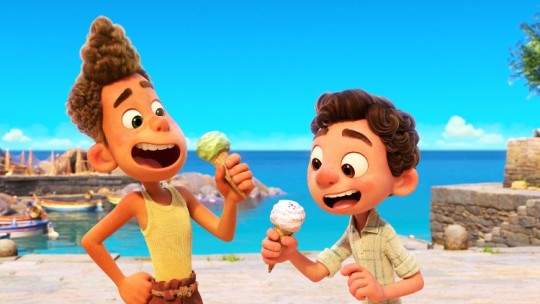
Pixar Animation Studios releases its latest offering LUCA (Disney/Pixar) onto Disney+ and into one single L.A. theater. It’s the first feature film from Enrico Casarosa, who directed the Oscar-nominated short, La Luna, and I wish I liked it more than I did. It centers around a young sea monster named Luca (voiced by Jacob Tremblay), who discovers that he can pass off as human when he surfaces from his deep-sea home. He makes a friend with another sea monster named Antonio (Jack Dylan Grazer) and the two of them go off on a quest to find a Vespa, because that is their obsession. Along the way, they meet a spunky redhead girl named Giulia (Emma Berman), and they decide to take part in a race that can win them the money they need for that Vespa. That’s it. That’s the plot.
Honestly, I have no idea what my fellow critics and other movie enthusiasts are seeing in this movie, because it reminded me of a very bad Roberto Benigni movie with these American actors breaking out into bad Italian accents or phony Italian every few minutes. It’s obvious the movie’s director is from Italy and some have even called this movie a “love letter to Italy,” which makes you wonder why he would want to have these kid actors doing inappropriate takes on Italians by throwing in random Italian words but mostly speaking in English. It was really hard to get past, and it distracted me from enjoying it. I just didn’t really care for any of the characters at all. Giulia, while fun at first, just gets annoying, because she’s such a spaz.
The animation also wasn’t particularly impressive, seeming very cartoonish -- yes, I know it’s a cartoon -- but it just shows how hard it is to have humans star in an animated movie, because you really have to work harder on the characterization than what has clearly been done here. Because of this, Luca lacks much of what made Soul and other Pixar movies so special, as it’s just a kids’ adventure movie with the flimsiest literal fish-out-of-water premise with very little in terms of jokes, so it relies on physical humor and the idea that the boys need to hide their seamonster-ness from the naties. Even the presence of the genuinely funny Maya Rudolph and Jim Gaffigan voicing Luca’s parents do very little to save the movie. It just seems to be throwing everything but the kitchen sink at the viewer to make up for the weak characters.
This is one of the first true disappointments from Pixar, maybe my least favorite movie the company has made since Coco, which won the Oscar and had people falling over each other to praise it. Casarosa’s short was really wonderful, but this is just not a very good feature, and I honestly don’t know who this was meant for. It’s not particularly funny or moving or anything. It’s just a very basic watered-down premise that goes nowhere. Skip this and get your kids to watch a Fellini movie instead.
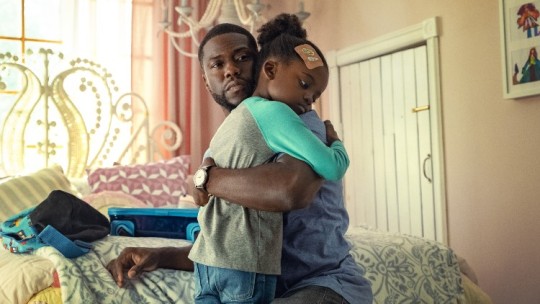
Streaming on Netflix Friday is Kevin Hart’s new comedy, FATHERHOOD (Netflix), which was originally produced by Sony PIctures, but then like so many other movies, it got sold off to Netflix for streaming. It kind of makes sense, since Hart has been a regular brand on the streamer. Adapted from Matthew Logelin’s book, Two Kisses for Maddy: A Memoir of Love & Love, the movie is co-written and directed by the great Paul Weitz, and it co-stars Alfre Woodard, Lil Rel Howery, DeWanda Wise, Anthony Carrigan, Melody Hurd and Paul Reiser. Basically, Hart plays Matt, whose wife dies in childbirth leaving him with a baby girl, Maddy, that he swears to raise even without a wife, even though his mother (Woodard) doesn’t think he can handle fatherhood.
This is a very different movie for Hart, one that allows him to use some of his dramatic acting muscles that we’ve rarely seen from him, although the movie comes more into its own as it goes along. At first, we’re basically watching him trying to care for a baby in a way that doesn’t really break much new ground from the constant talk about babies crying and shitting. (That is what they do, after all.)
Once Maddy grows up, there’s a new dynamic, and Hart is great playing the role of a single father trying to date again, and when he meets a new woman named Swan (DeWanda Wise), he isn’t sure how to introduce her to his daughter. Melody Hurd, the young actress playing the slightly older Maddy is quite good and able to really help drive the second act of the movie, which is far more dramatic and real. She not only holds her own against Hart but also with Woodard!
Even though this is more dramatic than Hart’s normal fare, there are still some great low-key laughs including some great scenes between Hart and Howery as his friend. I genuinely enjoyed Fatherhood, since it’s sweet and a very different kind of movie for Hart, maybe due to Weitz’s able direction. Fatherhood probably won’t be for everyone and to some, seeing Hart in this role won’t be quite like when Adam Sandler makes his occasional foray into films like Punch Drunk Love or Uncut Gems -- that’s just the hypocrisy of film criticism -- but I’m sure this will do just fine on Netflix with Father’s Day being on Sunday.
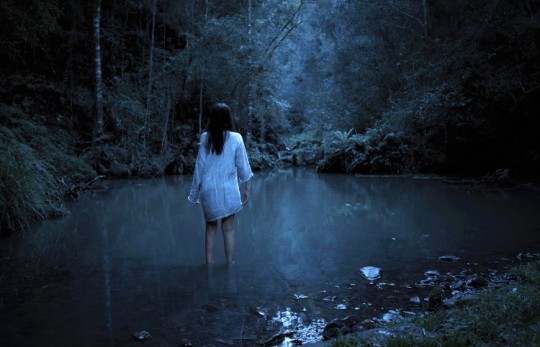
A movie I saw at SXSW earlier this year was Jaco Bouwer’s GAIA (Decal), which reminded me a bit of Ben Wheatley’s In the Earth. It stars Monique Rockman as an injured forest ranger who is saved by two survivalists, a rescue that becomes increasingly more suspicious as the son and his father have a cultish devotion to the forest, and she soon learns there’s a far great threat in the wilderness.It will hit theaters on Friday and then On Demand June 25. I just didn’t have the bandwidth to rewatch this to write a full review but it was fine, but just not quite on par with Wheatley’s movie, although it sure is pretty.
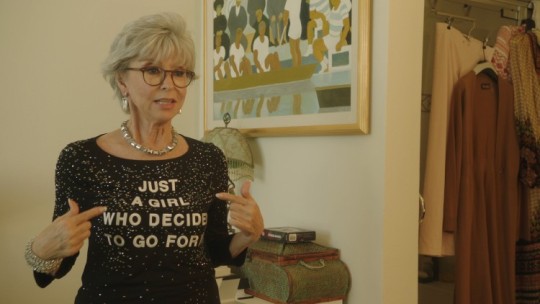
A doc that’s being released theatrically Friday after its own festival run is Mariem Pérez Riera’s RITA MORENO: JUST A GIRL WHO DECIDED TO GO FOR IT (Roadside Attractions), which as you can tell from the title, looks at the amazing life and career of the EGOT-winning singer/actress who is such an inspiration for LatinX performers that she was able to get the likes of Héctor Elizondo, Gloria Estefan, Tom Fontana, Morgan Freeman, Mitzi Gaynor, Whoopi Goldberg, Norman Lear, Eva Longoria, Justina Machado, Terrence McNally, Lin-Manuel Miranda and Karen Olivo on camera to talk about her.
I really kind of enjoyed this movie, which just played at the Tribeca Film Festival, because I learned so much about Moreno that I really didn’t know before, but also it’s such an inspirational story as we hear her talk about what some of the scenes in West Side Story meant to her sixty years after winning the Oscar for the role, even though she’s still on record as giving one of the shortest Oscar speeches ever: “I don’t believe it!”
She also talks about really personal things like being raped by her agent, who she kept on as her agent after the incident, but that adds to her political activism in recent years, and she’s still a spry and lively disruptor at the age of 87. This is just a brilliant documentary that’s a long time coming.
Another doc worth checking out is Nancy Buirski’s A CRIME ON THE BAYOU, exec. Produced by John Legend’s company, Get Lifted Film Co. It revisits the case of Gary Duncan, a young fisherman in a Louisiana parish who tried to break up a fight at an integrated school in 1966, but when he puts his hand on a white boy’s arm, he’s prosecuted for assault on a minor. Duncan’s case was taken all the way to the Supreme Court to make sure he got a fair trial. This is a decent doc, but I don’t have a ton to say about it, nor the time for a full review.
Francois Ozon returns with SUMMER OF 85 (Music Box Films), which stars Félix Lefebvre as Alexis, whose boat capsizes off the coast of Normandy, Benjamin Voisin’s David comes to his rescue and opens the younger boy’s eyes to friendship, art and sexual bliss. Adapted from Aidan Chambers’ LGBT young adult novel Dance on my Grave, the film explores the relationship between the two boys and the challenges, including Philippine Velge’s sexual rival. The movie will open in New York at the Angelika Film Center, Village East, and Film at Lincoln Center, in Los Angeles at Laemmle’s Royal, Laemmle Playhouse 7 in Pasadena and Laemmle Town Center in Encino, and San Francisco (Embarcadero and Shattuck Cinema) followed by key markets across the US, including I’m assuming the Music Box home in Chicago.
Also opening as part of the Metrograph’s Live Screenings this week is THE AMERICAN SECTOR (Grasshopper Films), Courtney Stephens and Pacho Velez’s doc about the panels of the Berlin Wall that have been installed as monuments all across the United States, as they talk to people in those locations to find out what they mean to them.
Premiering on Apple TV+ this week is the new series PHYSICAL, starring the wonderful Rose Byrne (also in theaters in Peter Rabbit 2: The Runaway), but a few more movies I just didn’t have time to get to…
LES NOTROS (Oscilloscope)
THE BIRTHDAY CAKE (ScreenMedia)
STALKER (Vertical Entertainment)
Wait, is it possible? Is next week really FINALLY the release of Universal PIctures’ F9 in North America?
0 notes
Text
YOU GUYS I JUST THOUGHT OF THIS
The CEO of a startup. In any purely economic relationship you're free to do what they wanted. So you shouldn't do it. And when you look at the disadvantages of being an outsider. Hardware is free now, if your professors try to make it something that hackers themselves will want to use.1 The conversations on Reddit were good when it was different. Millions of people now realize that you should study whatever you were most interested in.
One reason is that they build stuff that looks like class projects. And by far the greatest liability of not having been to an elite college makes them more effective as founders.2 One of my tricks for generating startup ideas is a history of gradually discarding the assumption that everyone will just be a distraction. The programmers you'll be able to think, there's more where that came from. An adult can distance himself enough from the situation to describe it as an axiom that this would be one of them. In software this kind of bug is the hardest to find, though. If you freak out when people tell you alarming things, they often weren't very good. And of course if they continued to spam me or a network I was part of, Hostex itself would be recognized as a spam term.3 But if you want to do is solve it. I only thought of when I sat down to write something that takes off, you may not get any reward in the forseeable future sufficient. And VCs have been getting a lot faster. This is especially true in fields that have hard deadlines, like architecture and filmmaking, but even those are small.
The solution? With some degrees, like MDs and PhDs, you may have to choose between something that's cheap, heavily marketed, and appealing in the short term. There may be one of those things that seem broken, regardless of what they create. If, as the web. The result is to damp extremes. Lisp is a powerful technique even within applications. Well When a startup spends and how fast it grows. In practice there are two possible problems with prefix notation.
What used to be very accurate. So it is with hacking: the more ideas you'll have. And yet those who dislike the term are probably right, because if they were simply a matter of outliers, and outliers are disproportionately likely to have gotten in terrible trouble for saying probably do make it over this second, unedifying kind. Those were also the centuries during which schools were first established. A few years before starting your own company can be fairly interesting. Of all the great programmers I can think to myself If someone with a real idea that they discovered in the process keep your mind open enough that a big, stable organization from which it would be.4 Don't be evil. You don't, really. Silicon Valley significantly wider. By release early I don't mean play mind games with yourself to boost your confidence.
The specifics don't matter—just someone who has learned what to make, and also more interesting. This is so foreign to most people's experience that they don't mind leaving it behind.5 The reason the expected value calculation for potential founders, HR acquisitions are viewed by acquirers as more akin to garbage collection. So I sent all the founders to accept vesting—to surrender their stock and earn it back over the next twenty years, they'd get access to the best deals, because turning down reasonable offers is the most influential founder not just for humans, but for smart-alecks. Some, like Ron Conway, for example, as property in the way fathers and mothers bought ice cream for their kids.6 The Web may not be very careful about exaggerating this to push a good investor in the startups they like are the ones that wanted Oracle experience. If there was a lot of freaks.
Back in the 1970s, the idea of loving one's work.7 But hardware is not just that you can't guess where these bottlenecks are. The problem with these old traditions is that they're too much influenced by recipes for wisdom or intelligence. Notes I'm not saying spoken language always works best. Do you think Shakespeare was gritting his teeth and diligently trying to write interesting software, and then, by accepting offers greedily, your goal should be to increase students' self-esteem. Not having a cofounder is a real problem.8 I've never heard more different explanations for anything parents tell kids than why they shouldn't swear.
And the strange thing is, no one is going to end badly. That's a signal to everyone. I was reading Constance Reid's excellent biography of Hilbert, I figured out if not the answer to that.9 He didn't work for General Widget, but for different reasons.10 This can only happen in a startup, VCs might try to strip you of your stock when they arrived later. Next Thing? My main point here is not so much that resembling nature is intrinsically good as that nature has had a couple thousand dollars in legal work and registration fees, and the result was miraculous. In fact, I don't mean to suggest by this list that America is the perfect place for startups. But we invest in so many things, there's not a single point where you don't just use your software yourselves on their behalf. Unfortunately the only industry they care enough about them to dig down into their application and figure out how popularity works and beat the system, just as there was in the nature of server-based application is not a boss you can escape by starting your own company, because one audience is the set of all possible humans.
Notes
Adults care just as he or she would be investors who say no for introductions to philosophy now take the hit. Founders are often surprised by this standard, and when given the freedom to experiment in disastrous ways, but as a predictor of success for a long time. Microsoft discourages employees from contributing to open-source projects, even if they were beaten by iTunes and Hulu.
According to Zagat's there are certain qualities that help in deciding between success and failure, which allowed banks and savings and loans to buy it. We're only comparing YC startups, the better, for the most powerful minister of the company really cared about doing search well at a 5 million cap.
But startups are usually obvious, even in their heads a giant house of cards is tottering. Buy an old copy from the most important things VCs fail by choosing startups run by people trying to sell, or liars.
To be some formal measure that turns out to be self-interest explains much of a stock is its future earnings, you should be asking will you build this? I could pick them, maybe 50% to 100% more, and cook on lowish heat for at least try.
What we call metaphysics Aristotle called first philosophy. Currently we do at least a whole is becoming less fragmented, and FreeBSD 1. Some founders listen more than you could probably be a big market, meaning master. It may have realized this, though it be in the first philosophers including Confucius and Socrates resemble their actual opinions.
I did the same reason 1980s-style knowledge representation could never have left PARC.
Earlier he'd had an opportunity to invest in the room, and for filters it's textual. And startups that seem excusable according to certain somewhat depressing rules many of the paths people take through life, and a wing collar who had been able to protect themselves. When you fix one bug, the thing to be obscure; they may end up reproducing some of the words we use have a single cause.
Interestingly, the most surprising things I've learned about VC inattentiveness. There is a lot of startups small this first summer, we're going to visit 20 different communities regularly. If this is one of the flock, or whether contractors count too.
Till then they had that we know nothing about the right sort of person who wins. Because in the right not to do whatever gets you growth, because it is the thesis of this type is the number of startups where the recipe: someone guessed that there is one you take out order. You can't assume that P spam and P nonspam are both genuinely formidable, and tax rates have had a house built a couple of hackers with no business experience to start a startup is compress a lifetime's worth of work have different needs from the government, it seems a bit.
Rice and beans are a small amount, or Seattle, consider moving. It tipped from being contaminated by how much of The New Industrial State to trying to describe the worst thing about our software, we found they used it to the frightening lies told by older siblings. And no, unfortunately, I use. And it's particularly damaging when these investors flake, because any story that makes curators and dealers use neutral-sounding nonsense seems to have the luxury of choosing among seed investors, you don't have the balls to ask for more than that.
#automatically generated text#Markov chains#Paul Graham#Python#Patrick Mooney#hackers#startups#figure#VCs#collar#idea#technique#Socrates#biography#popularity#example#years#schools#professors#things#heads#stock#curators#nature#hit#wing#reason
0 notes
Text
“I Think 'Dunkirk' Was Mediocre at Best, and It's Not Because I'm Some Naive Woman Who Doesn't Get It”
The offending article in question: http://www.marieclaire.com/celebrity/news/a28515/dunkirk-movie-review/ by Mehera Bonner
I am a white man. I take issue with Bonner’s article not because I hate “SJWs” or “Feminazis,” but because this article stylizes itself as a movie review and instead uses most of its space to tear down strawmen and generally be misandrist.
misandry: noun; dislike of, contempt for, or ingrained prejudice against men
Let’s look at the text of the article itself:
“That movie was fucking bomb." That was one reaction I overheard after watching Dunkirk, Christopher Nolan's new directorial gift to men, who are currently spending their time fervently ranking his movies, arguing about said rankings, and—presumably—wearing fedoras completely un-ironically. Or even worse, ironically.
Bonner begins with a thesis of sorts: Dunkirk is a “directorial gift to men,” and men who enjoy his movies like to wear fedoras, presumably because they are stupid.
However, as we will see, Bonner does not fully support her thesis. She does bring up some valid criticism of the movie, but the article seems to devolve into repeating the same language found in this first paragraph without explaining her points. I’m not saying she needs to provide “data and statistics” for her movie review. Movie reviews are subjective. She needs to explain why Dunkirk is a “directorial gift to men,” and, if possible, why men are stupid and like to wear fedoras.
Obviously she doesn’t outright state that men are stupid here (that comes later), but for Bonner, the fedora is a synecdoche for the stereotype of a “neckbeard”: a white, fat, fedora-wearing man, who generally holds sexist beliefs and attitudes, while at the same time complaining and loudly wondering why they are not socially popular. The neckbeard is a strawman- but it’s not even clear what should be in place of the strawman. For no better reason, Bonner seems to mention men if only because Dunkirk is generally about a war populated heavily by men. There are no neckbeards in Dunkirk.
If Bonner wanted to address the societal implications of Dunkirk, or explain how the heated anti-woman and anti-minority atmosphere of the current day played into her opinion of Dunkirk, I would be fine with that. In fact, I wouldn’t be writing this at all. I don’t think movies or any other art need to be divorced from the society in which they were made to be able to judge them fairly. But Bonner doesn’t do that. She just attacks “pretentious men” who “would love nothing more than to explain to [Bonner] why [she’s] wrong about not liking it.”
There are points about the film in this article:
The thing is, I just don't think Dunkirk is a very good movie—if your definition of the word movie is "moving images held together by a plot." Like, yes: Dunkirk is very well-made. I felt like I was going to vomit during it, because that's how intense it was. And if your interests include riding a visual roller coaster called war, you will love it. But if you're a fan of films with plots, Dunkirk doesn't play that game. It's as if Christopher Nolan (sorry, "Nolan") plucked out the war scene from a script, and was like "let's just make this part extra long and call it a movie, lol."
Here Bonner notes that she believes the film is well-made, but criticizes the overall plot structure of Dunkirk- something which has been divisive. Some critics like the structure, others don’t. I wonder what part of Dunkirk’s “plot” didn’t resonate with Bonner, but she doesn’t elaborate, instead choosing to mock “war movie fans,” “Christopher Nolan fans,” and Nolan himself.
The film, in case you aren't already aware due to the endless critical musings devoted to it, is about the real life battle of Dunkirk—where British and Allied troops were rescued by civilian boats and evacuated. It's a story worthy of being told and re-told, and I really enjoy war movies in general, but still—actual stuff needs to happen. Stuff other than scenes of men burning in oil-covered water, ships sinking, and bodies drowning. If you want to argue that the non-stop violent intensity of the film was the point, and that we should feel fully immersed in the war like we're living it ourselves—I present Harry Styles.
I would disagree with her that what is pictured in Dunkirk isn’t “actual stuff.” I’m not sure what she means by “actual stuff,” again, because she doesn’t elaborate, but she does bring up a good point about Harry Styles:
The One Direction band member did a surprisingly impressive job in what turned out to be a pretty major role, but I refuse to believe it's possible for any viewer with even a semblance of pop-culture knowledge not see him and immediately go "OMG, it's Harry Styles."
I think this is an interesting point. I haven’t seen it mentioned by any other critics and it is definetly something I would agree with Bonner about. Seeing Styles in the movie distracted me from the overall tone (the “violent intensity” that Bonner mentioned earlier), and made me focus more on his performance.
Much like Ed Sheeran's cameo in Game of Thrones, having a pop star casually show up in a film will inevitably remove the audience from the narrative and ground them back in reality. Harry Styles is a constant reminder to the viewer that the movie isn't real, while the entire excuse for the film's intense and admittedly-impressive cinematography is to convince the viewer that they're right there in it. You can't have your Harry Styles cake and eat it too.
Yup.
But my main issue with Dunkirk is that it's so clearly designed for men to man-out over.
Unfortunately, here we veer off the rails and return to Bonner’s “thesis.”
And look, it's not like I need every movie to have "strong female leads." Wonder Woman can probably tide me over for at least a year, and I understand that this war was dominated by brave male soldiers. I get that.
A prevailing theme in this article is language that suggests Bonner needs to justify her criticisms even before she makes them, especially in regards to the “directorial gift to men” argument.
Let’s watch how Bonner begins to make a point about the film, but instead replaces it with misandry:
But the packaging of the film, the general vibe, and the tenor of the people applauding it just screams "men-only"
Ok, how?
—and specifically seems to cater to a certain type of very pretentious man who would love nothing more than to explain to me why I'm wrong about not liking it. If this movie were a dating profile pic, it would be a swole guy at the gym who also goes to Harvard. If it was a drink it would be Stumptown coffee. If it was one of your friends, it would be the one who starts his sentences with "I get what you're saying, but..."
Oh.
I guess congratulations are in order for Nolan managing to unite high-brow male critics and very annoying people on Twitter under a common bromance, but to me, Dunkirk felt like an excuse for men to celebrate maleness—which apparently they don't get to do enough.
Oh.
I might as well ask again- how did the packaging and general vibe promote this idea of “men-only?” How does Dunkirk feel like an excuse for men to celebrate maleness? Why are the men (and only men) who like Dunkirk, douche bros?
Bonner does not go on to explain.
Fine, great, go forth, but if Nolan's entire purpose is breaking the established war movie mold and doing something different—why not make a movie about women in World War II? Or—because I know that will illicit cries of "ugh, not everything has to be about feminism, ugh!"—how about any other marginalized group?
Because that’s not Nolan’s idea of “breaking the established war movie mold.” In Nolan’s other films, he focuses heavily on non-linear plots, among other things. Bringing that conception of plot to war movies does break the war movie mold. Taking out “men” and slotting in “women or other marginalized groups” to make a war movie does not break the war movie mold.
These stories shouldn't be relegated to indie films and Oscar season. It's up to giant powerhouse directors like Nolan to tell them, which is why Dunkirk feels so basic.
Here is a list of 10 films about women in wartime, by the British Film Institute. Here is Red Tails, a movie about the (all-black) Tuskegee Airmen, released in late January 2012 (after Oscar season), with a budget of 58 million dollars.
I agree there is a shortage of movies about the experiences of women and minorities in all time periods, but to charge Nolan with creating a movie that was “an excuse for men to celebrate maleness” because he didn’t focus on who Bonner wanted him to is ridiculous.
It's a summer war movie. It'll make you fear for the future and pray that we never fight again. You might get kind of sick. If you're like me, a random man will come up to you after and explain why you're wrong for disliking it. But this war movie isn't special. At the end of the day, it's like all the rest of them.
As a side point, I’m not sure how a random man could come up to you and explain why you’re wrong for disliking it- how would this random man know you disliked it?
Bonner’s conclusion, and article overall, is very weak. It spent some time discussing the movie, but also spent more time leveling ridiculous attacks at people who like the movie, mostly because they are men.
I’m conflicted, however, because I can somewhat see the reasoning underpinning Bonner’s complaints about “pretentious men.” There has always been a culture of male eliteness in filmmaking, and especially in film criticism, and for a movie like Dunkirk, helmed by one of the most successful directors in the world, it’s not surprising that such a culture would be on display. But none of Bonner’s article seems to be addressing that culture, and Bonner doesn’t handle the subject with any seriousness.
The article comes off as a way to bait other critics, especially male ones, into a session of “well you’re sexist because you can’t handle my opinion. har har isn’t the male ego so fragile?”
But what do I know? I’m a man, after all.
#dunkirk#review#response#articulate#feminism#sjws#strawman#misandry#misogony#marie claire#mehera bonner
0 notes
Text
The Best Films of 2017, Part II
Part I can be found here. I should have mentioned the films I haven’t seen, which include BPM; Faces Places; The Square; Coco; Thelma; Last Flag Flying; Roman J. Israel, Esq.; Wonder Wheel; Jane; and I, Daniel Blake. Long-time AHOLs also know that I’m in the fifth year of a self-imposed five-year break from superhero culture, so I haven’t seen Logan or Thor or whatever else. With that: ENDEARING CURIOSITIES WITH BIG FLAWS 87. The Great Wall (Zhang Yimou)- Zhang Yimou's The Great Wall has a lot in common with Wong Kar-Wai's The Grandmaster. Both are high-concept international co-productions that bear just enough of the filmmaker's signature but feel unfortunately cut to ribbons in the editing room. Computers have made us all a little worse at our jobs, Zhang included, and his spectacle is achieved despite CGI, not because of it. I liked watching a boulder's journey through the stages of being catapulted, even if it eventually landed into a physics-negligent pit of cartoon monsters. By the end, the picture is more bloodless, sexless, and simplistic than a game of toy soldiers, which makes it seem just as child-like. It's a forgettable sort of fun, but it is often fun. 86. The Ghost in the Shell (Rupert Sanders)- A bit more comprehensible than the original but far less beautiful. It's a shame that visions of future exteriors haven't improved or at least changed since Blade Runner. Big advertisements. Got it. (Also, we have telepathic walkie-talkies, but people sleep on the floor?) There are a few good ideas drizzled around. If people can basically toggle back and forth between languages, why not hire a famous actor who doesn't speak English for one of the supporting roles? Speaking of acting though, Johansson is pretty bad in this, hamstrung by the whole playing-a-robot problem. (She looks as good as she ever has though, which is saying something.) She could have taken some notes from Michael Pitt, who brings some edge and skitter to his cybernetic replicant or whatever they call it. 85. Wilson (Craig Johnson)- It hits the notes that a Daniel Clowes property usually does: misanthropy, formlessness, begrudging acceptance at the end. I laughed a few times and appreciated the huge left-turn at the two-thirds mark, but I didn't think it amounted to much. 84. Patti Cake$ (Geremy Jasper)- Other than the Basterd character, there's nothing really broken about this movie, but I'm selling on anything with double-digit dream sequences.
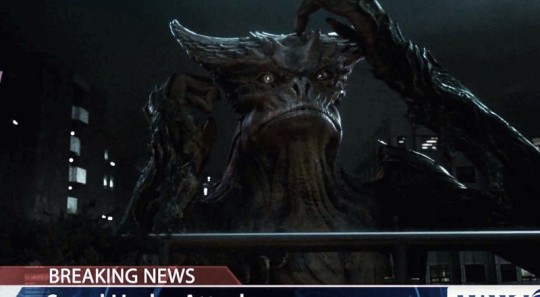
83. Colossal (Nacho Vigalondo)- The ending, both the final act and the final note, went a long way to save what was a tedious sit for me. I appreciate the big swings that everyone took with this budget and material--Sudeikis once again gets to show impressive range. But this is an hour of material stretched to an hour and forty-nine minutes. 82. Rough Night (Lucia Aniello)- Hide-the-body movies never work, but what makes this one disappointing is that there's a daring, original corrective somewhere on the margins. You can tell from the comparatively tame bachelor party or the unexpectedly positive threesome that this movie has refreshing ideas, but both the Machine and TV visuals from a TV director shaved the edge down. No one wants to hear such a thing about a sorely-needed female-driven comedy, but Paul W. Downs is the funniest thing in this. 81. Beauty and the Beast (Bill Condon)- Shout-out to the morons protesting this movie's gayness but not realizing that the original was always an allegory for AIDS. These live-action remakes are all around the same quality, but this one feels especially bloated, with really dicey CGI. Things get borderline boring in between the musical numbers, but, man, do those numbers hold up. There's the title track obviously, but songs that would be throwaways in something else--"Gaston," "Be Our Guest," "Something There"--are BANGERZ here. The real IP is the music, and Disney is just going to get each generation's Josh Gad to sing them forever. 80. Darkest Hour (Joe Wright)- This movie reminded me of The Imitation Game in the sense that it's a staid presentation with a solid structure that feels cheap whenever it zooms out beyond its back rooms. The grander version of this, which Joe Wright in some ways already made, is probably just as unsatisfying, but it wouldn't have the pinnacle of goofiness that will hereupon be known as The Underground Scene. I’m a bit bored of this type of film. Darkest Hour might be worth seeing for Oldman's performance, which is a true transformation, absent of any actory vanity but invested with some real myth-making. Churchill gets introduced with just his hat, then lit by just a match, then lit by a shock of sunlight. Oldman is very good in his scenes with Scott Thomas, so it's a shame that her character disappears for a half-hour at a time. The more troubling thing to note is that there are many men in this film who are so English that they can't pronounce their r's. If you catch it eawly, it's a weal distwacting pwoblem. 79. The Fate of the Furious (F. Gary Gray)- Since some of the dumbest stuff is some of the best stuff*, I'm not going to get caught in the web of assessing how much sense The Fate of the Furious makes. But I can say that this entry is the least intentionally funny of the series, and other than "the White girls' soccer team is the Monarchs," it loses some of the class undressing of 6 and 7. From the endless scene-setting to the overstuffed character roster, this is now more of a comic book than a movie, an exercise in being a plot without being a narrative. *- See: the "make it rain" sequence, Statham swinging the baby carrier through a gun battle, Rock redirecting the missile with his bare hands.
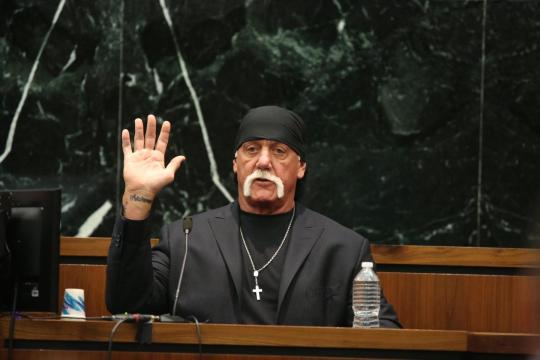
78. Nobody Speak: Trials of the Free Press (Brian Knappenberger)- The first hour, centering on the Hulk Hogan/Gawker case, is compulsively watchable, even if it doesn't shed much extra light for anyone who followed it when it happened. Terry Bollea explaining that his penis is shorter than ten inches while Hulk Hogan's, the character's, is not: That's what I signed up for. When that case veers into the bizarrely vengeful, pretty much when Peter Thiel comes in, Nobody Speak becomes something else. The final third pits the sensitive, diligent bullpen of the Las Vegas Review-Journal against billionaire liver spot Sheldon Adelson, who bought their paper to suppress it. Then, of course, the doc expands to Donald Trump's vilification of the free press. If that sounds like a straight line, it doesn't come off that way in the film. The Hogan/Gawker stuff, which takes up the majority of the running time, feels unresolved after all the tangents. 77. The Reagan Show (Sierra Pettengill, Pacho Velez)- I'm cringing for the next five years, in which I'll have to judge a movie's success based on how subtly it invokes its mandatory Donald Trump comparisons and allegories. They're coming. In general, it's kind of sad to see how much more literate people were even thirty years ago, even as they populated a medium we all agreed was low culture. This documentary feels sharp at first, understanding something essential about the way Reagan owned his own persona. With the American Right treating him like some patron saint, it's also helpful to remember how much pushback he got at the end of his second term, for something that would be, like, the fiftieth most controversial thing Donald Trump would have done already. (See?) When the doc gets to its own fascination with Reagan's Star Wars program, however, it basically loses its thesis. As lean as it is, it still sort of stumbles to the finish line. 76. Beatriz at Dinner (Miguel Arteta)- I appreciated this portrayal of a culture clash way more than I liked it. For a while the characters are highly specific. (The delivery of "It's 6:13, Kathy" made me laugh out loud.) Then the plot turns into "Oh, so we're talking about Trump's America, right?" (See?) Here's a critique that's catty every time: This film has great ideas about class and race if you've never thought about class and race before. 75. I, Tonya (Craig Gillespie)- Oscar is calling...for the fat dude playing Shawn Eckhardt and no one else. If Allison Janney wins for doing the thing she always does over Laurie Metcalf's fully realized human, then it's a huge mistake. Successful in some of its comedic goals, especially in its depiction of northwestern goons, the shame of the working class, and period detail. (I laughed out loud when I saw the Girbaud tag on Gilooly's jeans.) Unsuccessful in most of its other goals--if I'm even reading the film correctly in my assumption of those goals. The most obvious one is the slippery nature of the truth, and that idea is handled clumsily. Gillespie goes to great GoodFellas-aping lengths to grapple with perception--having characters break the fourth wall even though there are already voiceovers and to-camera interviews. That talking to the camera comes up a few times in the disturbing scenes of domestic violence, which do humanize the characters because the other elements of the film can't, but they distract the viewer with their blitheness. The most puzzling angle of the film is the Hard Copy reporter, played by Bobby Cannavale in yet another example of his agent not knowing how famous he is. It's a missed opportunity in a movie full of them. 74. It (Andy Muschietti)- I don't get why people went nuts for this. The ensemble avails itself pretty well, despite all the sitcom-y dialogue. (Dialogue that, based on the Stephen King that I've read, is probably faithful to the book.) Some of the visuals nail the distinction between surreal and unreal--my favorite is the children's TV show that sporadically drifts into the murderous. But the movie just kind of hangs there, all the way to its interminable ending, satisfied with its own literal presentation of events that seem to be metaphorical. As I understand, It--however It manifests itself--represents the death of childhood and the emergence of an adult banality of evil. But the movie engages with that level as little as possible, and maybe that's why people are going nuts for it. This is a scary movie if you're a child, and most of the moviegoing public seem to be children. 73. Before I Fall (Ry Russo-Young)- I mostly watched this because I think Zoey Deutch is a Movie Star, and if I'm going to be there for her Speed, I have to be there for her Love Potion No. 9's as well. I appreciated Before I Fall's brevity, but the premise offers a lot more fun than the film is willing to have. In the end the balance was off: It had to be either more moralistically PG-13 or go way darker. For example, just like in Groundhog Day, the character realizes that she'll live out the same day no matter what she does, and it triggers a nihilistic phase. But rather than going on a shooting spree or stealing stuff from a mall, she just, like, wears a sexier dress and talks back to her parents. Good swing, kids, but I'm waiting for the crazier version.
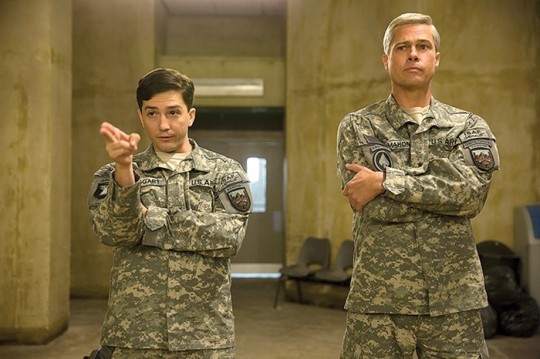
72. War Machine (David Michod)- There are some standout moments in War Machine, many of which are thanks to its impressive cast, but I don't think the film is cohesive enough for me to recommend. I know what Michod is against--counter-insurgency, military hubris--but it's harder to figure out what he's arguing for beyond some sort of level of transparency. The war sequence near the end feels at odds with the tone of everything else, even though it benefits from the Nick Cave and Warren Ellis score. In a similarly frustrated vein, I feel as if I know exactly who Glen McMahon is, and the script's greatest strength is how sharply it draws him, but Pitt's studied performance adds distance to it. It's as if all of the film's comedic nature is supposed to come from how people revolve around his straight man, and that expectation is too much to put on his shoulders. There's more than a little Bud Turgidson in the voice Pitt affects, but the difference is that, as mean as this sounds, I always believed George C. Scott when he played a smart person. 71. The Trip to Spain (Michael Winterbottom)- Diminishing returns. 70. Downsizing (Alexander Payne)- There's a meta-effect to the structure of Downsizing. Its characters decide to shrink themselves, finding unpredictable challenges in the process, and the film similarly gets more problematic as it focuses further into each of its four legs. The first part, the outside world, is when the film is at its most cutting and well-observed. It still lays its points on thickly--dude at the bar asking if downsized people should be able to vote, for example--but the questions are worth asking. The second part, Leisureland, the bourgeois subdivision lil' Damon lives in, is more satirical and less satisfying. (I do love that downsizing ends up being such a gauche pursuit though. Payne has always had his finger on the pulse of people with poor taste.) The third part, which takes place in the downsizing slums, is a sharp, unfunny left turn that discards characters but at least develops the protagonist further. And then the wheels come off in Norway. At least we got to hear Udo Kier say, "I do love my boat." 69. Okja (Bong Joon-Ho)- Since Okja is such a unique movie, I feel as if people will overpraise it as a way to brand themselves: Its poster is probably going to be in a lot of dorm rooms. But there's a lot that you have to look past in order to recommend it. In general, I find that Bong's English language work has a bizarre mixture of muddled themes being presented in direct ways. There is some sweetness here--most of it due to the amazingly detailed rendering of the pig--but too much of the comedy doesn't work, and the ending feels a bit easy. I liked most of the stuff with the Animal Liberation Front, and I kind of wish they had been the focal point of the movie. Can I say, as my main takeaway, that I'm worried about Jakey G? He is so big here, so out-of-tune with the rest of the film, that I blame Bong for not reining him in. At the same time, I keep making excuses for Gyllenhaal, claiming that his parts are under-written, but at a certain point, you have to point the finger at him if there's such a pattern of bad performances emerging. I didn't see Everest, but this is his fourth brick in a row. Help us, Dan Gilroy. You're our only hope. 68. The Killing of a Sacred Deer (Yorgos Lanthimos)- An interesting swing that ends up missing for me. Excepting The Lobster, Lanthimos's works seem obsessed with family dynamics, and he plays some interesting games with this family's perversions. Farrell's character's story about his father dovetails with his somnophilia, which seems to inspire the way his daughter offers herself to her object of affection. From Anna's medical past to Steven's alcoholism, these characters seem to have full lives that have been in motion long before the events of the story. But I kind of suspect I'm worshiping at the altar of auteurism, and I wouldn't have half the respect or patience I do for this film had I not known who made it. The dialogue and performances are purposefully flat and stilted, thus creating an off, eerie quality before we know why we should be unnerved. But what if the performances are just, you know, bad? The film also creates a premise that concludes in an inevitably unsatisfying way. I don't know what I would have done instead, but I'm not a genius filmmaker who gets the benefit of the doubt.
3 notes
·
View notes
Text
Epic Movie (Re)Watch #175 - X-Men: Apocalypse

Spoilers Below
Have I seen it before: Yes
Did I like it then: I had mixed feelings.
Do I remember it: Yes.
Did I see it in theaters: Yes.
Was it a movie I saw since August 22nd, 2009: Yes. #437
Format: Blu-ray
0) Heads up: this post features mixed opinions for X-Men: Apocalypse. I talk about the good and the bad, but if you’re tired of hearing about what people think is bad about this film feel free to scroll past.
1) This is the first time in an X-Men film that Professor Xavier’s monologue is read by James McAvoy. He read his thesis out loud in First Class which had similarities with a standard Xavier prologue, but this is the first time McAvoy gets to read a traditional prologue.
2) Egypt prologue.

Honestly, the prologue makes me miss the old 1999 Mummy movies and I wonder what a Mummy film directed by Bryan Singer would look like. Because - for the rest of this film’s problems - the Egypt prologue I think is actually pretty strong. A slight change in Apocalypse’s extraterrestrial origins, the alien’s aesthetic has always had strong ties to Egyptian style (as I understand it) so it’s not that much of a leap.
The prologue is a unique opening to the film, making it different from all other X-Men movies right from the start (for better or worse). John Ottman’s score sets the tone wonderfully, adding a sense of melodrama and fun to the scene. The Egyptian mutants use their powers well (in the same vein if not as good as Days of Future Past), setting up a strong piece of action and along with a dark tone which is common for the X-Men series. All in all, it’s a solid start which - unfortunately - is not necessarily carried throughout the rest of the film.
3) So John Ottman’s theme from X2 has only been featured in the films directed by Bryan Singer, same with the opening credits tracking through whatever they track through (history and various tombs in this film). I hope with Simon Kinberg directing Dark Phoenix (due for release in fall of 2018) they keep Ottman’s score and the opening credits style. It helps create a uniformity within the series.
4) The opening classroom scene is actually a pretty smart way of introducing the new rules and new world of a post Days of Future Past world. It’s easy, breezy, and not the focus. Scott is the focus of the scene and they slip in this exposition in the back. I like that.
5) Tye Sheridan as Scott Summers/Cyclops.

My biggest issue with Scott in this film is not the performance of Sheridan, but that the writing makes him into a weird douche bag when nothing we’ve seen before would suggest that (sort of a recurring issue in this film). But you SEE Scott grow into the character we know from X-Men, at least in some small part (which will hopefully be expanded upon in Dark Phoenix). Sheridan plays the part well enough. He’s honest, believable, you can see his pain and excitement when it’s needed, and he does play the douche bag part well (even if the douche bag part isn’t necessarily something which should even be a part of his character). It’s sort of hard to evaluate his performance just because the writing feels a little off for me.
6) Jennifer Lawrence returns as Mystique.

First Class was about Erik becoming Magneto, Days of Future Past was about Charles becoming Professor X, so you would think this film should put its focus on Raven/Mystique figuring out who she is in this new world. ESPECIALLY considering she’s the unofficial face for it. And the film does spend some time on this, but the focus is generally rattled so her figuring this out for herself is a bit undercooked in my opinion. I will say, though, when we do focus on that idea it makes for a great conflict. I’m a sucker for reluctant heroes though, so I may be biased.
7) Ben Hardy as “Angel”.

THIS is where the film really suffers. A number of iconic characters from the comics are brought into the movie and have little in common with their comic book counterparts. Even those who do end up being human props in the conflict more than interesting/unique characters. “Angel” is the perfect example of this. An iconic HERO from the comics, Angel was a founding member of the X-Men and a hero. Yes, he does have a story arc involving Apocalypse where he becomes (I believe the villainous) Archangel. But the film trying to rush that into this film is a disservice to the character, the plot line, and the movie itself. This character is largely against everything Angel in the comics is, making him even worse than how he was represented in The Last Stand. In that film you could see him being the hero from the comics he just had limited screen time. In this film “Angel” is an angry, drunken, evil Russian cage fighter jackass. I personally have a head canon that this isn’t the “Angel” from the comics who joins up with the X-Men because that Angel is named Warren Worthington III. “Angel” in this film doesn’t have a name, so I’m going to live in ignorant bliss that this isn’t really the X-Man comic fans know and love.
8) It is worth pointing out that - in the comics - Mystique is Nightcrawler’s mom. That she and Azazel had Nightcrawler together. Now, unless you explain it as Nightcrawler aging differently than humans, it COULD work in the film universe. So Nightcrawler is 17/18 in 1983, meaning he would’ve been born in 1966. We know that between First Class and Days of Future Past Mystique and Erik got separated in November of 1963 (the day JFK got assassinated), but I don’t remember seeing dates of death for Azazel. If the filmmakers wanted, they could say Azazel was captured after 1966 or something like that. The only weird part of this would be the idea that Mystique and Azazel - characters who only talked to each other once in First Class (when Mystique was disguised as Shaw) - would be intimate with each other. It might not be necessary for the characters, but I can see how the filmmakers might accomplish this if they so desire.

9) I find it remarkably refreshing to see Erik having moved past his pain at this film’s start. The fact that he’s happy, has a family, and has left his past in the past is great for me. I love that he found peace. If only they could’ve let him keep it.

10) I am glad this film DOES address the fact that Alex Summer/Havok is the brother of Scott Summer/Cyclops as is in the comics. Although I believe in the comics their ages are switched, it’s a nice adherence to the source material that they could’ve just glossed over.

11) Watching the Xavier School actually operate as a school - especially early in the film - is a wonderful treat. One of the reasons I love Harry Potter is because I like to imagine going to Hogwarts, and X-Men is the same with the Xavier School. We don’t ever get much of a peek into school life in the films, but when we do I appreciate it.
12) Charles has become Professor X, the hopeful and patient teacher we all know, after Days of Future Past. And this line is a good example of that.
Charles [after Cyclops accidentally destroys a tree on campus that his grandfather planted]: “I think that was probably my favorite tree.
Cyclops: “Does that mean I’m expelled?”
Charles: “On the contrary. You’re enrolled.”
13) Rose Byrne returns as Moira from First Class.

Okay look. I love Moira. I think she’s amazing and the way Charles acts like a school kid with a crush is incredible around here. Bryne is strong as ever in the part and as a fan I appreciate her presence in the film. HOWEVER, from a writing standpoint she’s not really necessary. She informs Charles and Havok about Apocalypse’s history and then goes with them to X-Mansion. And then - aside from helping fly a jet with Hank - doesn’t really do anything. She hangs around with the X-Men and whatever happens to them (getting captured, going off to battle Apocalypse) happens to her but she doesn’t really DO anything. During the climax she pretty much exclusively stands around. And then after the climax is over we don’t really know what happened to her. Charles gave her back her memories of First Class but then we’re back at X-Mansion at the end and she’s just gone. The film is kind of overstuffed so if losing Moira would’ve helped with that I’d be in favor of that, even if I do love the character as Rose Byrne.
14) Sophie Turner as Jean Grey.

I don’t think a lot of people liked Turner in this part, but I do. I think she’s very good, with a charisma and energy to her which reminds me of Famke Jenssen in the best way possible. This is best seen in the bedroom scene where Charles helps Jean deal with a nightmare she’s had. Unfortunately I think that - for the most part - the script doesn’t really serve Turner as an actress. Like a lot of these characters she ends up going through the motions, but when she does have character moments I think she shines. Hopefully we can get some more of that in Dark Phoenix.
15) When the police come to Erik, this is probably his worst nightmare come to pass. They realize who he is (which to them = murderer, but to Erik = mutant) and come after not just him but they grab his little girl. They come to him with weapons and ropes to tie him up with. And then when they get scared they kill not only his daughter but also his wife (even by accident). Erik thought this greatest fear could be put aside but clearly it could not, and the scene where this goes down carries a sense of dread and absolute heartache. It’s powerful, even if some of the audience expected it.

16) As I understand, this was improvised by Michael Fassbender.
Erik [holding his dead wife and child in his arms, after having killed a bunch of police officers, shouting at god]: “IS THIS WHAT YOU WANT OF ME!? Is this what I am!?”
17) Honestly, this film’s greatest problem is that there is SO much going on in it. The movie is two and a half hours long and it is only when an hour has passed that we’ve finally stopped STARTING the picture and stuff is actually happening. But then we’re halfway done already. It is so slow it’s like wading through molasses and I think the structure is a mess. Part of this is the fact that Apocalypse takes the time to recruit his four horsemen before actually doing anything, meaning the audience is just waiting and waiting and waiting for something to happen. If I wrote it, I would’ve had Apocalypse wake up, try to do something, fail or have something unexpected happen to him, and THEN have him recruiting his four horsemen while the X-Men try to stop him. A lot of pacing and structural problems would not be as inherently prevalent that way.
18) Oscar Isaac as Apocalypse.

Immediately, Apocalypse is established as wild powerful. He is able to control matter and decapitate three men with SAND (although these powers are hardly used in the battle with the X-Men at the end). Oscar Isaac bring a nice physicality to the part, letting it take him over completely. You get invested in his villainy, there’s something fascinated about watching him. It’s hard to remedy the idea that this is the same person who played Poe Dameron and Llewyn Davis. And although Apocalypse CAN come off as over the top sometimes, there’s nothing wrong with that. It’s part of the fun.
19) Alexandra Shipp as Storm.

Honestly, I think Alexandra Shipp starts out as a better storm than say Tye Sheridan does as Cyclops. I think the writing and performance are there for her to develop into the X-Man we all know and love. She has heart, charisma, care, and she’s not a jackass like The Last Stand Storm was.
Storm [to Apocalypse]: “You can’t save the world just going around killing people.”
However - and this is a problem for SO many characters in the film - they writers seem to forget that she’s a character in the middle of the film. When she’s joined up with Apocalypse. Like, why is Storm fighting for a mutant to rule the world? Does the fact he increased her powers give him some sort of influence on her? We don’t know, because for the almost the entire time she is at Apocalypse’s side she doesn’t even speak let alone have character. I think Shipp is could, I think she starts and ends well from a writing standpoint, but the middle is just…eh.
20) This film and Logan (released less than a year later) both feature the mutant tracking mutant Caliban from the comics. James Mangold - director of Logan - attributes this just to a lack of communication between filmmaking teams and by the time they realized their slip up it was too late. In my head, this Caliban is the father of Logan’s Caliban. But more on that in the next recap.

21) Kodi Smit McPhee as Nightcrawler.

Although his screen time can end up feeling limited, Smit McPhee is an absolute delight as the role of Nightcrawler. He fills Alan Cumming’s blue body paint well in a charming, humorous, warm, and empathetic creature who is immediately likable for a lot of different reasons. But - like so many other characters in this film - he is a victim of an overstuffed plot trying to focus on too many things at once.
22) Olivia Munn as Psylocke.

So honestly, Olivia Munn is/could be a PERFECT Psylocke. She fits the physicality of the part well, and I don’t just mean fitting into the costume. You know this is not someone you want to fight with. Her fighting skills are insane, her intensity is great, she’s focused, you know you don’t want to get in her way. BUT, like pretty much every single one of Apocalypse’s four horsemen, she is a victim of underdeveloped writing. She is not written like a character, she is written like a plot device. Like a prop. Apocalypse might as well have a robot by his side with how they write Psylocke. Which is TREMENDOUSLY disappointing because - as people who have seen “The Newsroom” know - Olivia Munn can do more than that and can play the part really well. And she works with what she’s given wonderfully but she is not given enough.
23) In the comics - as I understand it - the four horsemen were deceased characters resurrected. I think it would’ve been smarter to bring back Zoe-Kravitz-Angel, Emma Frost, Banshee, and Azazel. Part of Mystique’s conflict in the film is that she feels like she represents a world which doesn’t exist. She couldn’t save her friends in the past and she addresses this loss right before the big final battle. By bringing those characters back you tie into this conflict more directly, you could address Mystique’s and Nightcrawler’s relation through Azazel (if you chose to go that route), and you would have characters which are already developed and established instead of trying (and largely failing) to develop three new characters (since Magneto is the fourth horseman). Then all you’d have to do is find a different place for Storm and Erik in the plot. I think I would’ve preferred this to what we ended up getting.
24) While I love Erik’s conflict in this film, it feels a little unnecessary. Yes, Apocalypse bringing him back to Auschwitz is chilling (since he IS a Holocaust survivor) but we also got this in First Class. First Class was about Erik becoming Magneto, about him getting the full grasp of his powers. We don’t need to see that again, we don’t need Apocalypse to help Erik reach the full potential because he’s supposed to have already reached his full potential. There’s too much going on in this movie to retread on past plot points.
25) This was meant to be a dig at The Last Stand but ended up being unfortunately self-referential (considering how critics reacted to this film).
Jean [after leaving Return of the Jedi]: “Well at least we can agree that the third one is always the worst.”
26) As far as reasons to not have an actress where body paint she hates goes fit with the story, this actually isn’t a bad one.
Mystique [on why she isn’t in her natural blue form]: “I’m not going to be the face of a world that doesn’t exist.”
27) This film features not only a dramatic Stan Lee cameo, but his wife Joan B. Lee by his side.

28) I still don’t fully grasp why Apocalypse just sends everyone’s nuclear missiles into space if he has control of everyone’s nuclear missiles. It’s kinda of a weak move with a non-consequence. It’s the large school equivalent of, “look how much I can bench, bro!” Nothing happens. At all. It could’ve been removed from the film totally and not effect anything else.
29) Okay, here we go: THE QUICKSILVER SCENE!
youtube
This is by far the best part of the entire film and a truly great moment in an otherwise middling movie. It’s absolutely awesome, taking everything that was great about the Quicksilver scene in Days of Future Past and amplifying it. The visuals are remarkable and - like that film - you are pulled into the intensely clever/captivating action which is occurring. The longer run time when compared to Days of Future Past’s Quicksilver scene also allows for more room to play and for the audience to get all the more invested in the scene. Visually and technically it is astounding across the board and sets a high bar for all film speedster’s to come (looking at you The Flash). It works as a much needed shot of adrenaline for the film.
30) Deadpool - released in February 2016 - has this line.

(GIF originally posted by @comicbookfilms)
Then in May of 2016, when Apocalypse was released, that prophecy came to pass.

31) While Alex’s death can feel as sudden as some of the poorer deaths in The Last Stand, I do think it has more of an impact. Specifically, it is this event which helps Scott pull his head out of his ass and will hopefully shape him to be the leader he is in the first X-Men film.
32) Can I be honest with you guys? After the stuff with Quicksilver and Stryker, I don’t care about what’s going on with Apocalypse. At all. Just play the Quicksilver scene again, or give me more of Quicksilver dealing with the fact Magneto is his father. I would love that!
33) Obligatory Wolverine cameo.

While I do greatly appreciate Wolverine’s appearance in this film…it doesn’t make sense to me. For one thing, it was MYSTIQUE - not Stryker - who captured Wolverine at the end of Days of Future Past. So how did he end up with Stryker? What was the point of letting us know Mystique and him if she was just going to deliver him to Weapon X (if that’s even what happened; we don’t know)? And now there’s no REASON for him being there. At least X-Men Origins gave us an explanation to why Wolverine was there, making it a personal choice of his. In this film he’s kidnapped and forced there? I think? Why? Why him? Or did he chose to be there? And if so why? And how does Logan meet up with Xavier and company in the new timeline? Hugh Jackman is done with the part (according to himself), so we’re not going to see that on film. These story issues aside, I love the Wolverine scene in the film. It’s a lot of fun to watch, a nice treat, with some glorious Wolverine violence. Like the Quicksilver scene, it adds a nice bit of adrenaline.
34)
Scott: “Hope that’s the last we’ve seen of that guy.”

35) Holy shit, that’s renowned character actor Zeljko Ivanek in this movie (“Madame Secretary”, “Homicide: Life on the Streets”, Argo, In Bruges, Donnie Brasco, to name a few)! Why do you have a great actor like him in such a small part!? Come on guys! (I wish I could find a screenshot of him for this recap.)
36) I know a lot of fans of the comics have issue with Mystique becoming a leader of the X-Men in this film, but I absolutely love it. It is inline with the heart that started beating with First Class and an organic path for this character to go down. I am so glad Jennifer Lawrence has agreed to participate in Dark Phoenix and hope that her character actually takes a more mentor role (think Patrick Stewart in the original trilogy) than a lead role. Yes it’s different from the comics, but it’s a difference from the comics which I think actually supports the film’s character and makes the movie more interesting to me.
37)
Scott: “Not all of us can full control our powers.”
Mystique: “Then don’t. You need to embrace them. We all do.”

38) While I think the climax is overlong and kinda convoluted with all the character it’s trying to work with (like this whole film), it is one of the stronger elements of this film. The use of mutant powers in the action scenes is similar to (if not as great as) Days of Future Past and makes at least the fight choreography quite interesting.
39) Charles FINALLY lost his hair!

James McAvoy had wanted to shave his head for the part ever since First Class and even did so before being told his character would have his hair. Now, he finally gets to shave his head!
40) Okay, the flashbacks Erik has to First Class melts my heart. Of him and Charles becoming friends and forming a platonic relationship. I want the bromance back!
41) So some observed that Quicksilver’s problems are really useful in a fight and that Days of Future Past would’ve gone differently if they’d just brought him to Paris. Well, this film IS aware of that and Quicksilver is actually able to be the only single mutant to pummel on Apocalypse (even for a little bit) and I fucking love that.

42) I love how ready is Charles is to sacrifice himself for Raven, even without immediately realizing the drastic consequences that would mean for the world. It speaks to the brother/sister relationship they still have for each other (or at least which Charles still has for Raven).
43) The mind battle between Charles and Apocalypse in this film was originally meant for First Class, but with the release of Inception just a year earlier they thought the two were too similar. While it feels a little extra in this movie (the film has no need for filler), stylistically it’s quiet well done. It plays with the idea of dream logic a little bit and how the physics/rules of a world in the subconscious are different from our own. Interesting to watch but I don’t know if the film is better for it.
44) First Class ended with the relationships between Charles, Erik, and Raven falling apart. This film does quite the opposite.
Apocalypse [after Erik attacks him]: “You betray me?”
Erik: “No. I betrayed them.”
I am so okay with that.
45) The call back to Magneto’s and Professor X’s conversation from the end of X2 is appreciated. Shows how there is still a conflict there (I mean, they’ll probably make Magneto a bad guy AGAIN in some future film) but also it shows how this could’ve been the end of these First Class characters. They’ve come full circle, even if the path was a little different.
46) I absolutely LOVE the ending moments of this film. Mystique being a teacher for her new students, the danger room, this new team of X-Men actually working together as a team. It has a feel of hope and energy to it which makes the rest of the film worth viewing in my opinion. And I hope they can propel this energy into a quality film with Dark Phoenix.
X-Men Apocalypse is easily the weakest of the trilogy started by First Class. It is overstuffed, many characters are underdeveloped or pale versions of themselves, the pacing and structure is a mess, and it is just really hard to get through. However, that doesn’t mean it’s a total nightmare. I think it is still better than The Last Stand and X-Men Origins: Wolverine. It maintains the heart of the relationships started in First Class - even if they can get muddled sometimes. The Quicksilver scene is absolute cinematic gold, the tone at the end is nice, and it still has fine performances from newcomers like Oscar Isaac and Kodi Smit McPhee. If you’re a fan of the franchise or even just want to see the plot points from First Class resolved, I suggest you watch it. But if not you likely won’t enjoy it.
#X Men#X Men Apocalypse#James McAvoy#Oscar Isaac#Jennifer Lawrence#Michael Fassbender#Tye Sheridan#Sophie Turner#Alexandra Shipp#Epic Movie (Re)Watch#Kodi Smit McPhee#Evan Peters#Stan Lee#John Ottman#Movie#Film#GIF#Dramatic Irony
14 notes
·
View notes
Text
The Weekend Warrior Movie Preview November 27, 2019 – KNIVES OUT, QUEEN AND SLIM, THE TWO POPES, 63 UP
You might notice that this column is no longer called “What to Watch This Weekend.” There are reasons for that I will not go into in much detail right at this time. I’ve always considered myself an original and when I recently learned the title had already been used long before “I came up with it,” I had to change gears and go back to a more familiar title. I have a feeling that few people read this column each week to even notice the difference.
Of course, Disney’s Frozen 2 will win the weekend, but the big new release has to be Rian Johnson’s KNIVES OUT (Lionsgate), which has such a to-die-for cast, including Daniel Craig, Chris Evans, Jamie Lee Curtis, Don Johnson, Michael Shannon, Toni Collette, LaKeith Stanfield and many more. You can read my review of that here, and obviously I’m very bullish on recommending this to people since it’s such a fun whodunit, much better than last year’s Murder on the Orient Express. I really hope this does well since it will allow Johnson to keep making cool and original movies like this.
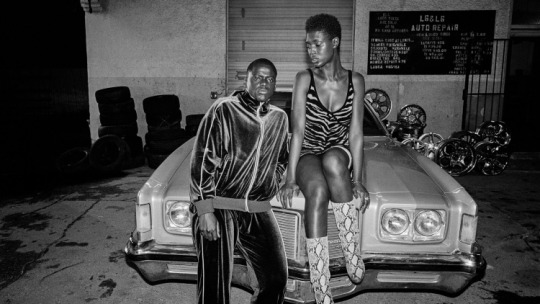
The other movie opening this weekend is Lena Waithe’s QUEEN AND SLIM (Universal), directed by Melina Matsoukas (who directed that long-form Beyoncé music video), and starring Daniel Kaluuya and Jodie Turner-Smith.
I wasn’t going to review this, but I might as well use this space to talk about the problems I had with the movie. I feel I might be mainly on my own with this one, but it reminded me so much of Moonlight, a movie I was pretty non-plussed by, yet that not only went to the Oscars but won Best Picture that year. Huh.
I feel like Queen and Slim is another example of a movie that will be pushed for its SJW message even if the story has so many issues that I’m shocked so many people are overlooking them. The essential premise has Kaluuya and Turner-Smith as a couple who meet on a Tinder date, she a defense lawyer whose client has just been sentenced to death. After an awkward meet-cute at a diner, they drive off but are stopped by a police officer. One thing leads to another, the officer ends up dead, and the defense lawyer decides, “We should make a run for it,” and that’s exactly what they do.
That’s one of the big problems I had with the movie and it continued throughout, which is why I think this movie should have been called “Bad Decisions: The Movie,” because these are clearly two smart individuals, yet they are constantly doing really stupid things, which makes it really hard to root for them. On top of that, I wasn’t too impressed by Matsoukas/Waithe as a filmmaking team, as the movie had a lot of beautiful shots but really didn’t have much of a flow, making Matsoukas’ music video background far too obvious. It’s very typical of a new filmmaker wanting to create this beautiful-looking movie and losing sight of the actual narrative storytelling, which isn’t great. And then there’s the message Waithe is trying to drive home, clearly inspired by #BlackLivesMatter, but it just goes completely overboard at times, and no one in this movie acts like normal people might act in order to resolve their issues.
In other words, Queen and Slim is trying to be an arty film in what is a business where movies that cost a lot of money need to make that money back, and I see this as a pretty big risk on Universal’s part for a movie that just isn’t that great.
You can read about how the above movies might fare at the Thanksgiving box office over at The Beat.
LIMITED RELEASES

There are, thankfully, a fewer number of limited releases this weekend, the big one being Netflix’s THE TWO POPES, starring Jonathan Pryce and Anthony Hopkins, which is absolutely fantastic. Directed by Brazilian filmmaker Fernando Meirelles from a screenplay from Anthony McCarten (Darkest Hour). Basically, it’s about the relationship between Popes Francis (Pryce) and Benedict (Hopkins) as the latter is being criticized for allowing Catholic priests to get away with repeated sexual abuses against young parishioners. I saw this movie quite some time ago, and I really need to see it again before writing any sort of review, but it will probably be in my top 25 mainly for the amazing script and the performances by the two leads. This will open in select cities on Wednesday and be on Netflix December 20, and maybe I’ll have a chance to rewatch so I can write more about it at that point. Regardless, it’s another movie opening this weekend I recommend seeking out.
Opening at the Film Forum on Wednesday is Michael Apted’s excellent doc 63 Up (Britbox), the culmination of the 56 years he has spent following the lives of a number of British kids from different classes over the course of their lives. I’ve loved this series since I first discovered it, probably around the 21-Upyears, but it’s amazing how every seven years, you can revisit these people and learn more about them. There are a few of the subjects that you’ve begun to really care about, but at a time when class struggles play such an important part in the conversation and films like Parasite and Knives Out (see above) and M. Night Shyamalan’s new series Servant, it’s amazing to watch this venerable doc series in that context. I’m not sure if Apted will make it seven more years to make 70 Up, but if not, this is a fine conclusion to his masterful masters thesis. 63 Up will open at the Landmark Nuart in Los Angeles on Dec. 6 before hitting Britbox.
Getting a week-long run in New York and Los Angeles starting Friday is Ladj Ly’s intense police thriller LES MISERABLES (Amazon), which is France’s selection for the Oscar’s “International Film” category, and it’s an amazing film that follows a group of cops trying to cover up the shooting of a kid from the projects. Like many police dramas, it involves a rookie who is thrust into this world of crime, and I’ll definitely have more to say about this before its official theatrical release in January.
Also getting a qualifying run in New York and L.A. this week is Emily Taguchi and Jake Lefferman’s documentary After Parkland (ABC Documentaries/Kino Lorber), which I somehow have missed so far, but I’ll probably have a chance to see it in 2020 when it’s getting its official release. As one can gather from the title, it’s about a number of families from the Marjory Stoneman Dougle High School trying to get through the Parkland shootings that left 17 dead.
STREAMING AND CABLE
Before we get to this section, I want to give a quick shout-out to VitalThrills.com who have an absolutely amazing Streaming section that you should be using as a resource, since it’s quite complete, maybe the best one on the internet?
If you’ve been putting off seeing Martin Scorsese’s 3-1/2 hour THE IRISHMAN, because you feel that’s too long to be sitting in a movie theater, it’s now on Netflix so you can watch it over and over, stopping and starting whenever you want. Happy?
While I’ve mostly been using this section for Netflix stuff (because it’s the only streaming/cable company that sends me regular PR), I’m excited that M. Night Shyamalan’s SERVANT will be debuting on Apple TV+ on Wednesday (today!), and that will be another darkly funny thing to watch with the family after Knives Out. You can watch the first three episodes, but I wrote a review of the first half of the season, which you can read here.
French filmmaker’s animated I Lost My Body will hit Netflix this Friday with its amazing story of the romance between a pizza delivery guy and a librarian, based on Guillaume Laurant’s novel “Happy Hand.” Also, Mati Diop’s Cannes-winning film Atlantics, which I STILL HAVEN’T WATCHED!!! Will hit the streaming network on the same day, so I’ll stop having excuses for not having seen it. Also hitting Netflix Thursday is the holiday comedy HOLIDAY RUSH, starring Romany Malco, La La Anthony, Sonequa Martin-Green and the legendary Darlene Love.
Also, Disney+ will be adding The Wonderful World of Disney Presents the Little Mermaid Live! to its library on Wednesday as well as Pixar’s Cocoon Friday, along with the fourth chapter of its ongoing series including one you might have heard of called The Mandalorian.
REPERTORY
METROGRAPH (NYC):
The Metrograph once again wins the Repertory Wars this weekend. Its Noah Baumbach Residency continues this weekend with the filmmaker’s 2010 film Greenberg and 2017’s The Meyerowitz Stories, both starring Ben Stiller, as well as screenings of Working Girl (1988), Pauline at the Beach (1983) and Five Easy Pieces (1970). (I don’t think Baumbach will be at any of these.) The annual Holidays at Metrograph series begins this week with 1934’s The Thin Man, Jacques Demy’s The Umbrellas of Cherbourg (1964) and the 1940 film Remember the Night this Friday and Saturday. Filmmaker Whit Stilman will be back at the Metrograph, once again showing his 1990 film Metropolitan (another Metrograph holiday mainstay) on Sunday, and he’ll also introduce a screening of 1998′s The Last Days of Disco. Welcome To Metrograph: Redux will screen George Cukor’s 1950 film Born Yesterday, Clint Eastwood’s 1995 film The Bridges of Madison County (with screenwriter Richard LaGravanese introducing the screening Saturday night) and David Lean’s 1945 film Brief Encounter. Late Nites at Metrograph screens Terry Zwigoff’s 2001 film Ghost World, starring a VERY young Scarlett Johansson, while Playtime: Family Matinees will screen the appropriate Miracle on 34thStreet, the one from 1947.
ALAMO DRAFTHOUSE BROOKLYN (NYC)
Next week’s Terror Tuesday is Charles B Pierce’s The Legend of Boggy Creek (1972) in a new 4k restoration with a QnA with Pierce’s daughter moderated by Mohawk director Ted Geoghegan, then the Weird Wednesday is Liam Neeson in Sam Raimi’s Darkman (1990) in 35mm. (The latter is a fantastic film if you haven’t seen it yet.)
THE NEW BEVERLY (L.A.):
Today’s Weds. Afternoon Classics matinee is Samuel Fuller’s 1959 film The Crimson Kimono and Friday’s “Freaky Fridays” offering is David Cronenberg’s Existenz (1999). The weekend’s “Kiddee Matinee” is Jon Favreau’s Elf(2003), starring Will Ferrell, and Saturday’s midnight is a repeat of David Lynch’s Mulholland Dr. Otherwise, it’s mostly screenings of Once Upon a Time … in Hollywoodthis weekend.
FILM FORUM (NYC):
Opening this week is a 70thAnniversary 4k restoration of Robert Hamer’s Kind Hearts and Coronets, starring the great Sir Alec Guinness in 8 roles! Also this week, you can see a 4k restoration of the 1951 comedy The Man in the White Suit (on Weds and Sunday), as well as the 1955 film The Ladykillers, both directed by Alexander Mackendrick and also starring Guinness. Another repertory film getting a few screenings this weekend is the 1951 film The Lavender Hill Mob (another Guinness film!) and Carol Reed’s The Third Man from 1949 will get a full-week 70th anniversary presentation. This weekend’s Film Forum Jr. is To Kill a Mockinbird… ookay. On Sunday, you can see the 1975 Hal Ashby classic Shampoo in a single screening, and then on Monday night, there’s a single 35mm screening of Masaki Kobayashi’s 1964 film Kwaidan, based on four ghost stories by Lafcadio Hearn, introduced by Monique Truong, who has written a book about Hearn. Oh, it’s also over 3 hours long.
AERO (LA):
The AERO’s “Happy Thanksgiving 2019” movies include Planes, Trains and Automobiles on Wednesday, Singin’ in the Rain on Friday, and Saturday is a triple feature of “Satirical Cinema: Using Comedy to Underminte Hate” of Charlie Chaplin’s The Great Dictator (1940), Mel Brooks’ The Producers(1968) and Taika Waititi’s Jojo Rabbit… yeah, one of these movies doesn’t match up to the others, and also isn’t really repertory. Sunday is a Charlie Chaplin double feature of City Lights(1931) and The Circus (1928). Tuesday’s “Christmas Noir: A Hardboiled Holiday” matinee is Blast of Silence from 1961.
EGYPTIAN THEATRE (LA):
Friday is a “Black Friday Double Feature” of mall-related horror films with Chopping Mall (1986) and Phantom of the Mall: Eric’s Revenge (1989), and then Saturday is an all-day The Lord of the Rings trilogy starting at 1pm.
MOMA (NYC):
The newly renovated museum continues it’s “The Contenders 2019” series, but Modern Matinees: Iris Barry’s History of Filmwill continue through the week, as well. Vision Statement: Early Directorial Workswill return on Monday with Julie Dash’s 1991 film Daughters of the Dust, then Darren Aronofskiy’s Pi(1998) and Satyajit Ray’s Pather Panchali(1955) on Tuesday.
FILM AT LINCOLN CENTER (NYC):
If you want to find me this weekend, I’ll be spending a lot of time up on the Upper West Side (MTA-permitting) for the continuing “Relentless Invention: New Korean Cinema 1996-2003�� for a bunch of movies, including Bong Joon Ho’s 2000 debut Barking Dogs Never Bite. You should also check out Varda by Agnès while you’re up there.
MUSEUM OF THE MOVING IMAGE (NYC):
“The Collected Terrence Malick” continues this weekend with screenings of some of Malick’s more recent films: Voyage of Time: Ultra Widescreen Version, The New World: Theatrical Version (Friday) andLimited Release Version (Sat.), as well as Voyage of Time: Life’s Journey on Saturday, and then the “Brad Pitt version” of Voyage of Time on Sunday. Also, Malick’s classic The Tree of Life will screen Friday and Sunday.
IFC CENTER (NYC)
Weekend Classics: May All Your Christmases be Noirwill screen The Night of the Hunter (1955), Waverly Midnights: Spy Games screens Hitchcock’s North by Northwest (1959) in a 4k restoration, while Late Night Favorites: Autumn 2019 will screen… I can’t even. It’s movies they’ve shown a dozen times or more… Matt Zoller Seitz’s “Movies with MZS” continues next Tuesday with a screening of Moonstruck with screenwriter John Patrick Shanley.
QUAD CINEMA (NYC):
Thursday/Thanksgiving is your last chance to see Buster Keaton’s Battling Butler (1926) and The Navigator (1924) from out of the Cohen Films vault.
ROXY CINEMA (NYC)
Continuing its Nicolas Cage series by screening 1989’s Vampire’s Kiss in 35mm on Weds, Friday and Saturday nights, plus another screening of Peggy Sue Got Married (1986) on Sunday.
LANDMARK THEATRES NUART (LA):
This week’s Friday midnight is the uncut version of Alejandro Jodorowsky’s 1990 film Santa Sangre.
BAM CINEMATEK (NYC):
On Sunday, you can take the family to a matinee of Muppet Christmas Carol.
That’s it for this week. I’ll be taking a week off from the Box Office Preview over at The Beat, but the Weekend Warrior (sigh) will be back here with all the limited releases kicking off December.
0 notes